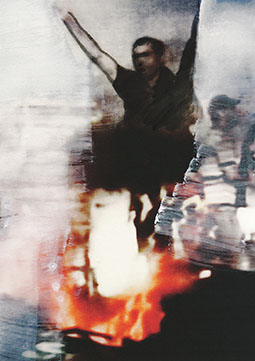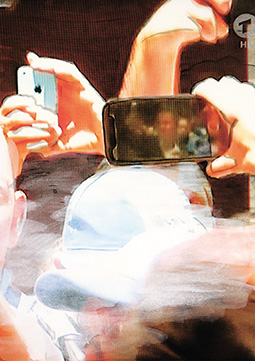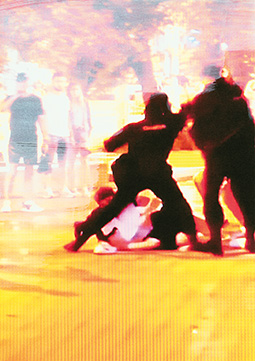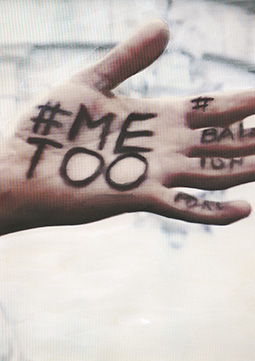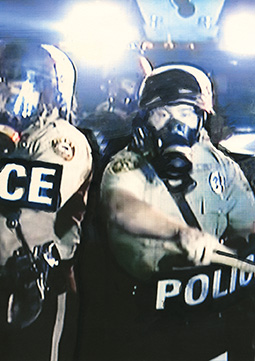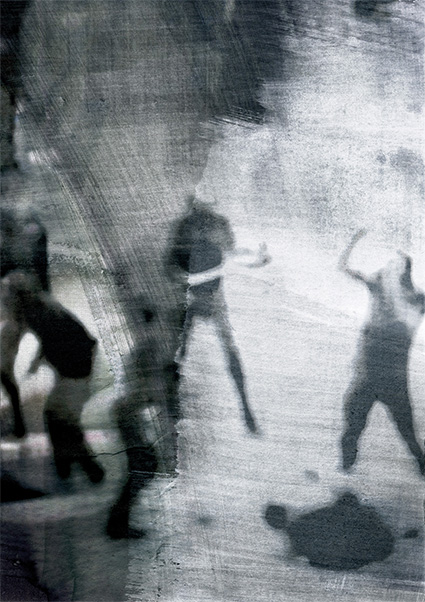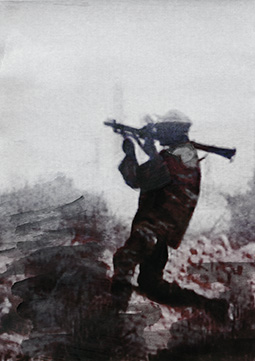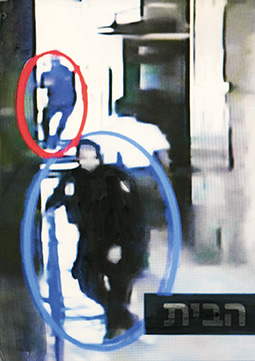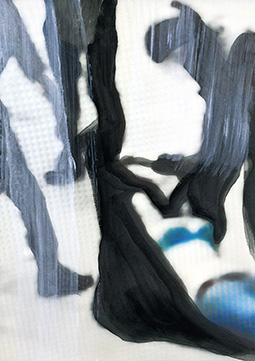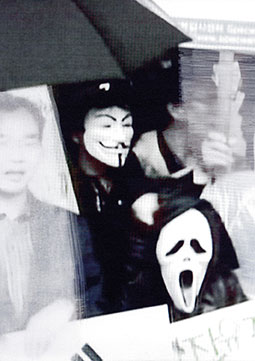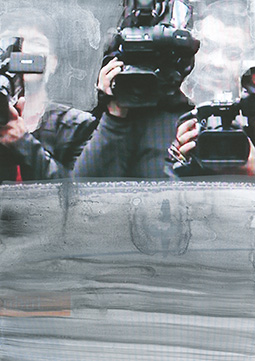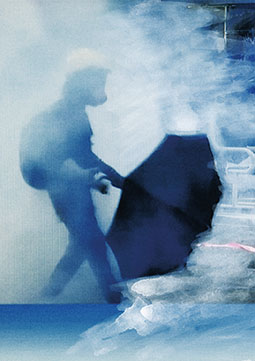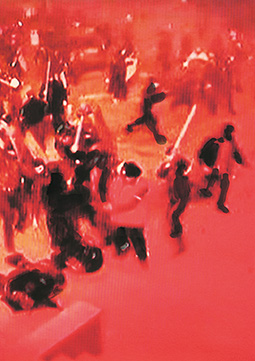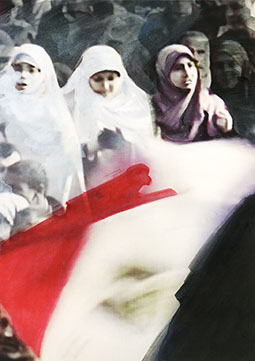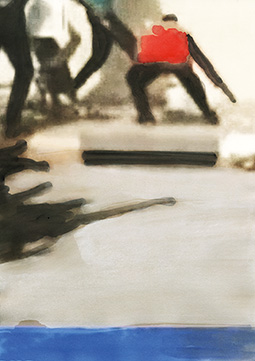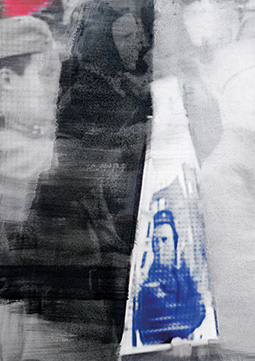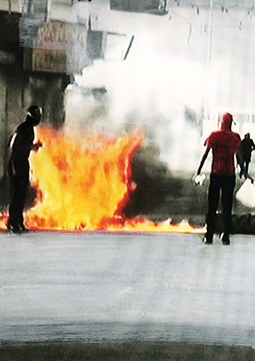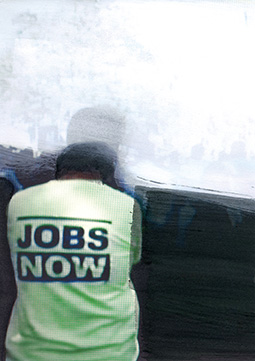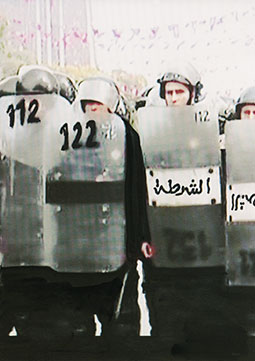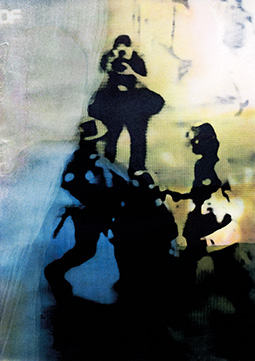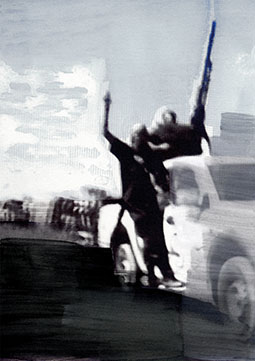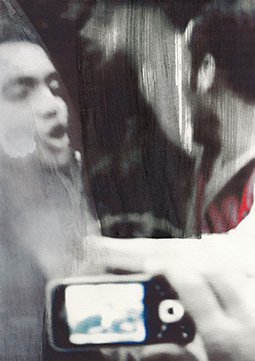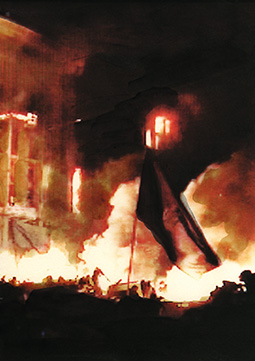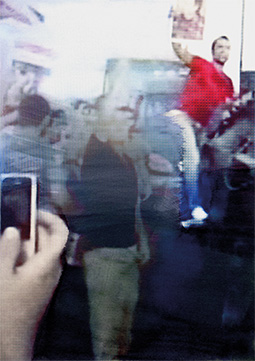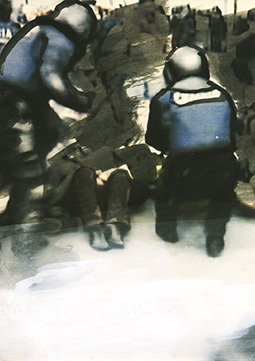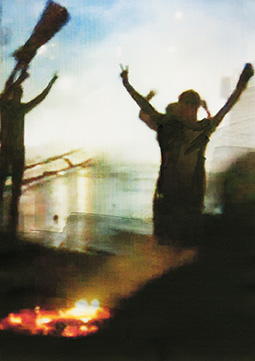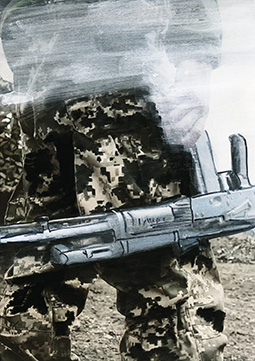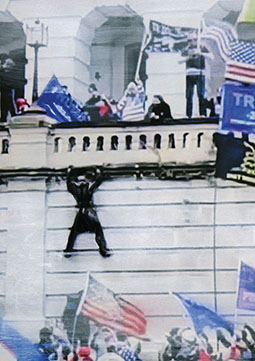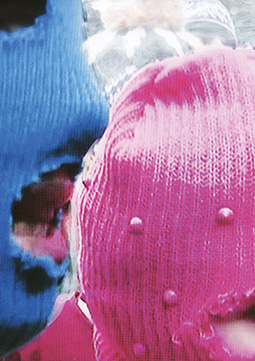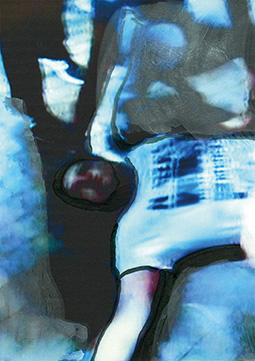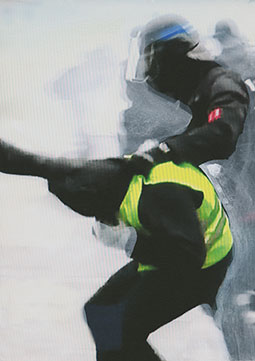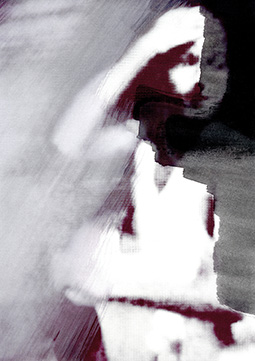
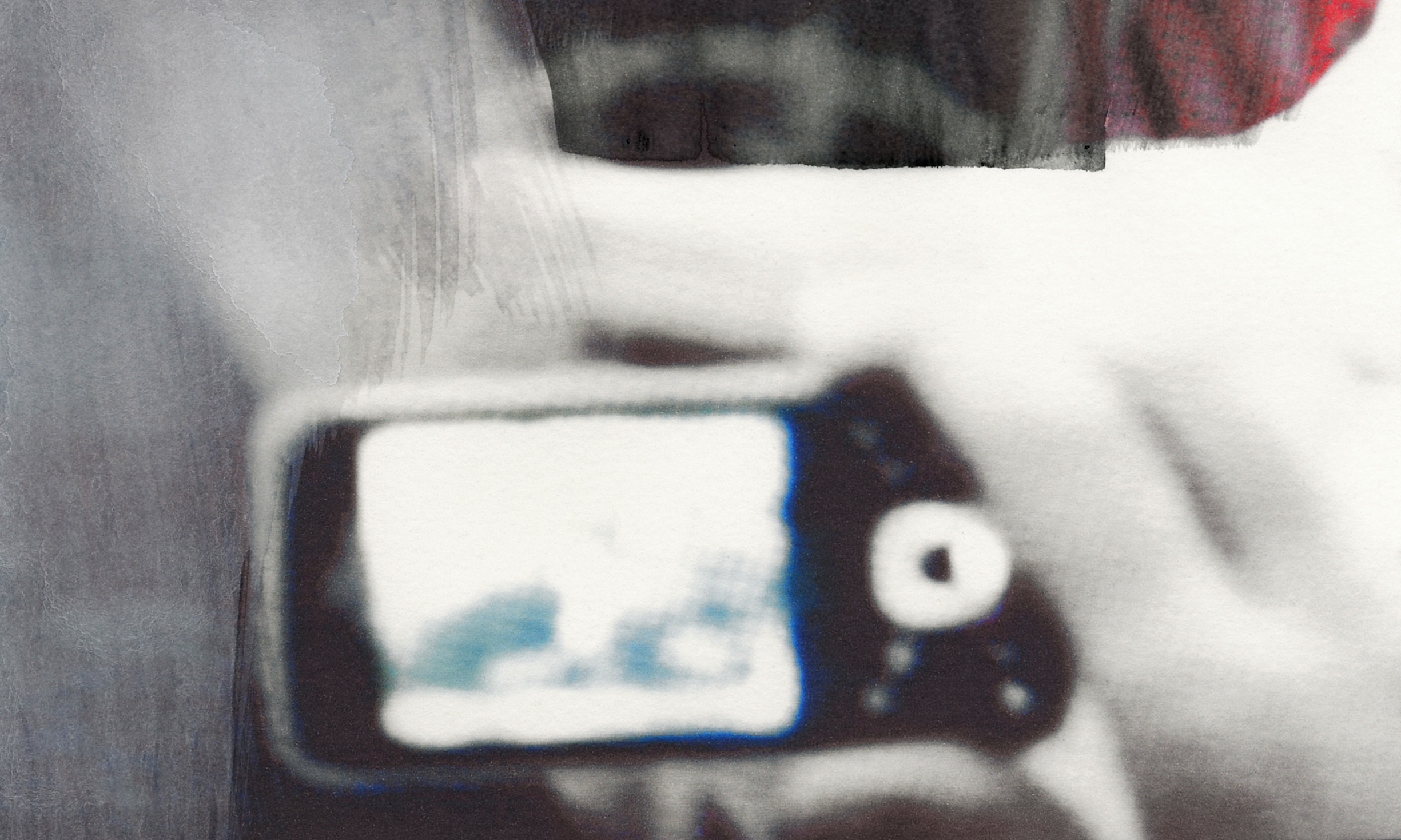
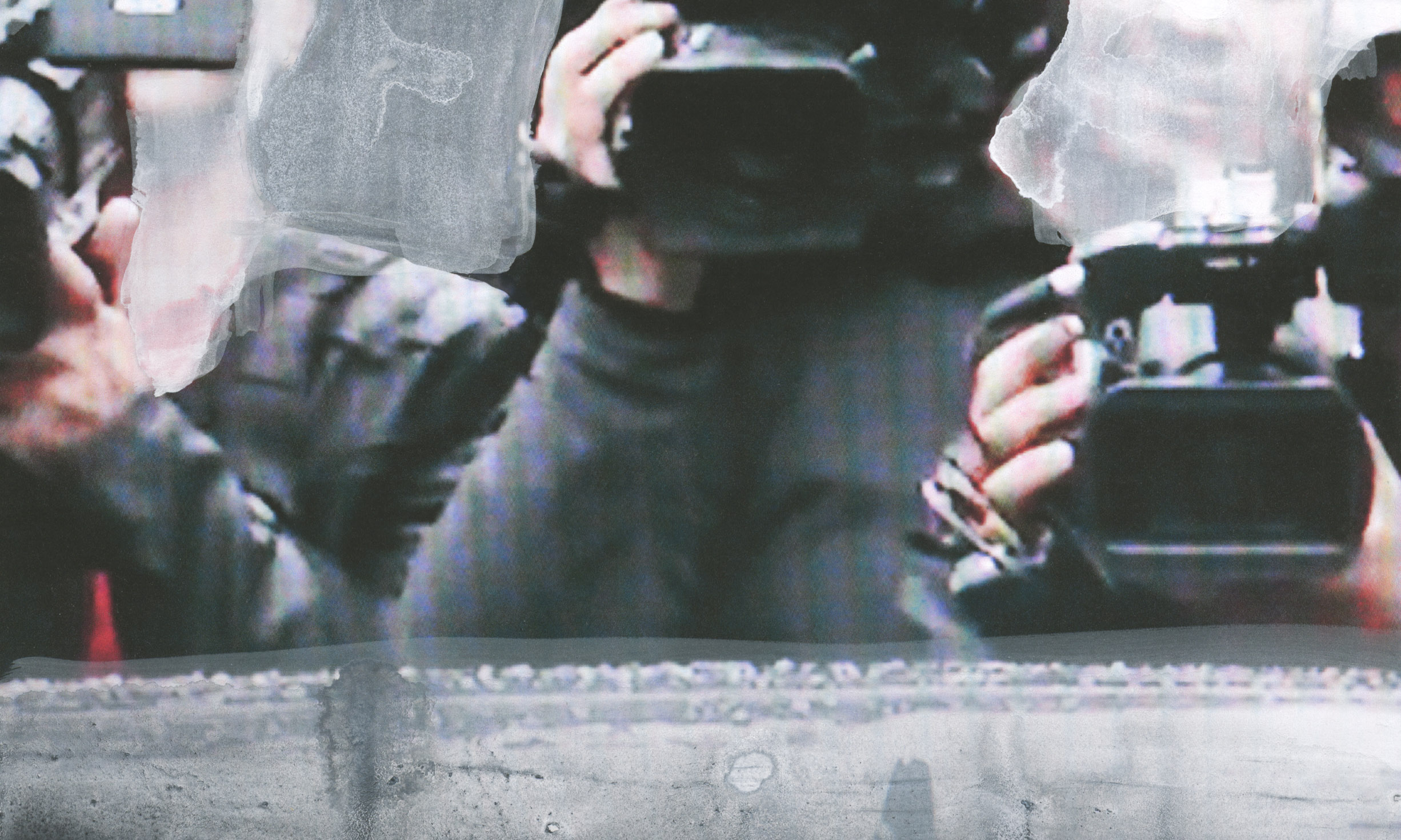

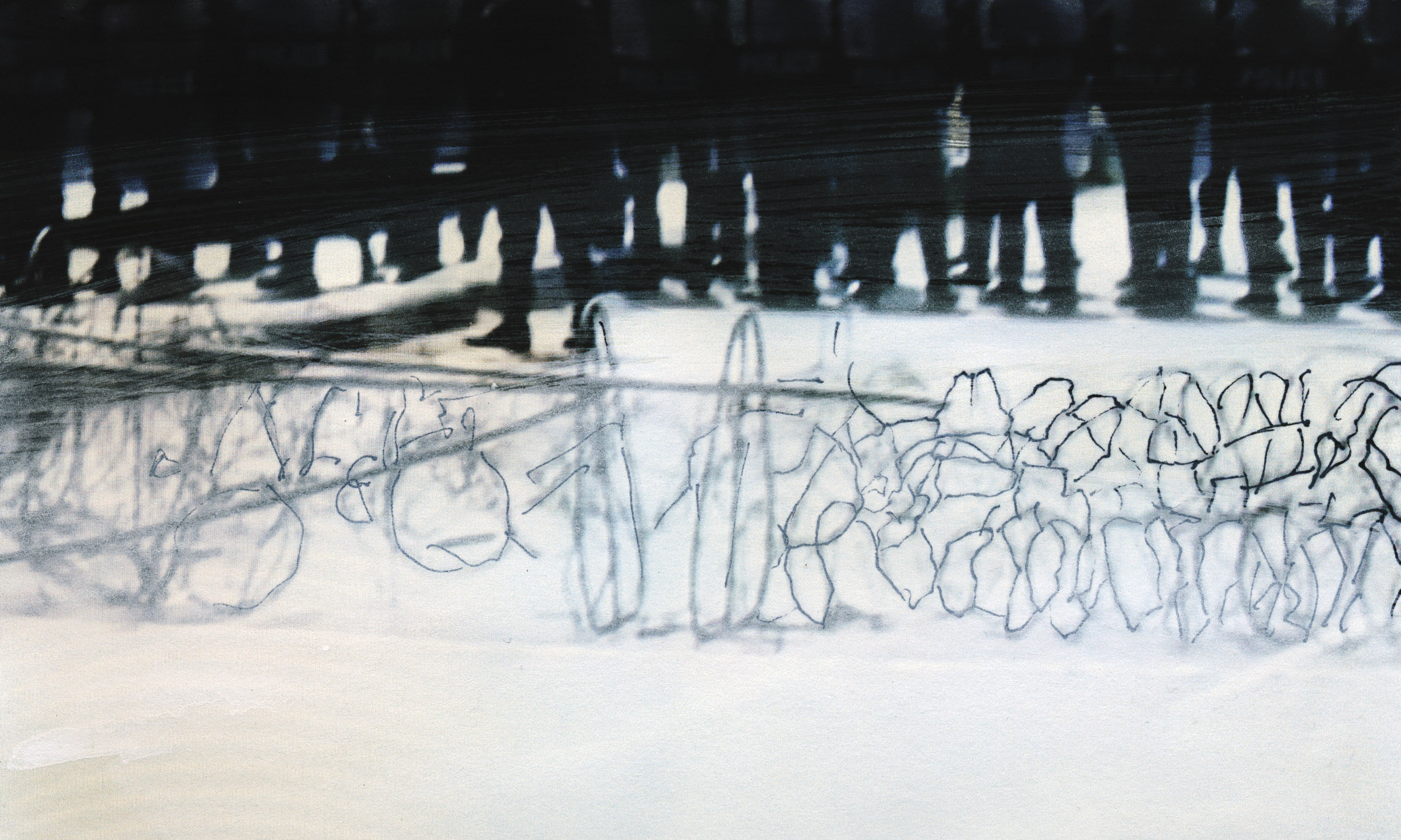

LECTURE
Activating a Collection Artists’ Estates in the Digital Space
Georg Kolbe Museum
Georg Kolbe Museum
April, 15th 2024, 15.00-19.00 p.m.
Digital Workshop at Georg Kolbe Museum Berlin
On the occasion of the current exhibition Noa Eshkol. No time to Dance, the Georg Kolbe Museum is organizing an international workshop focused on contemporary approaches to and productive ways of working with artists' estates and archives in the digital space.
Register here
Digital Workshop at Georg Kolbe Museum Berlin
On the occasion of the current exhibition Noa Eshkol. No time to Dance, the Georg Kolbe Museum is organizing an international workshop focused on contemporary approaches to and productive ways of working with artists' estates and archives in the digital space.
Register here
PREVIEW
Mindmaps, Traces and Layers
Galerie Smudajescheck
Galerie Smudajescheck
April, 11th – May, 18th 2024
Opening: Thursday April 11th, 2024, 6.00-8.00 p.m
Artist talk with Benita Meißner, DG Kunstraum | Munich
Schwindstraße 3
80798, Munich
Link to the exhibition
Opening: Thursday April 11th, 2024, 6.00-8.00 p.m
Artist talk with Benita Meißner, DG Kunstraum | Munich
Schwindstraße 3
80798, Munich
Link to the exhibition
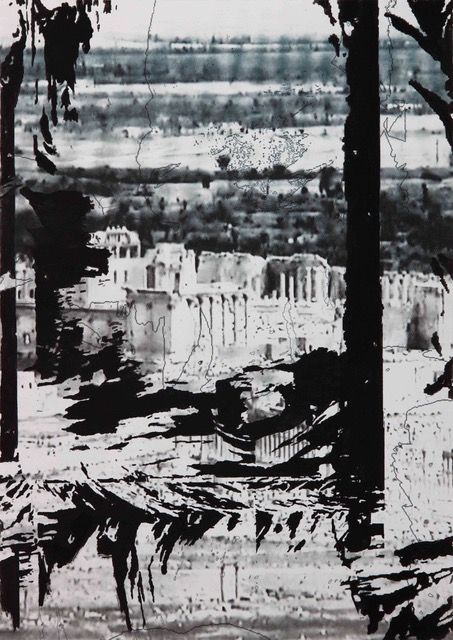
ARTIST TALK
PaintingPhotography
Zentrum für Gegegnwartskunst im Glaspalast
Zentrum für Gegegnwartskunst im Glaspalast
EXHIBITION
PaintingPhotography,
Zentrum für Gegenwartskunst im Glaspalast
Zentrum für Gegenwartskunst im Glaspalast
July 28th, 2023 – Extended until January 28, 2024
Opening: Thursday July 27, 2023, 7.00 pm
PaintingPhotography illuminates artistic concepts at the interface between photography and painting. The blending and intertwining of both fields has long been creating transitions that are barely perceptible on the surface, and not just on a technical level. The visual portfolios of artistic image invention are increasingly dissolving categorisations according to classical standards in favour of new pictorial forms in which theoretical reflection, poetry and new associative spaces are emerging. Dissolution and expansion are equally poles that further define and develop the interplay between photographic and painterly images. Twelve artists from France, Great Britain, Israel, Germany and the USA show 'pure' and cross-media works of photography, painting and video.
with Roni Ben Porat ∙ Philipp Goldbach ∙ Monika Huber ∙ Karen Irmer ∙ Kotek ∙ Claire Laude ∙ Zoe Leonard ∙ Richard Prince ∙ Kerstin Skringer ∙ Rosemarie Trockel ∙ Troika ∙ James White
Beim Glaspalast 1
D-86153 Augsburg
Link to the exhibiton
Opening: Thursday July 27, 2023, 7.00 pm
PaintingPhotography illuminates artistic concepts at the interface between photography and painting. The blending and intertwining of both fields has long been creating transitions that are barely perceptible on the surface, and not just on a technical level. The visual portfolios of artistic image invention are increasingly dissolving categorisations according to classical standards in favour of new pictorial forms in which theoretical reflection, poetry and new associative spaces are emerging. Dissolution and expansion are equally poles that further define and develop the interplay between photographic and painterly images. Twelve artists from France, Great Britain, Israel, Germany and the USA show 'pure' and cross-media works of photography, painting and video.
with Roni Ben Porat ∙ Philipp Goldbach ∙ Monika Huber ∙ Karen Irmer ∙ Kotek ∙ Claire Laude ∙ Zoe Leonard ∙ Richard Prince ∙ Kerstin Skringer ∙ Rosemarie Trockel ∙ Troika ∙ James White
Beim Glaspalast 1
D-86153 Augsburg
Link to the exhibiton

PUBLICATION
Archiv Einsdreissig /
Archive OneThirty
Archive OneThirty
One minute and thirty seconds is the average length of a news report. For over ten years, artist Monika Huber has been photographing images from news reports every day that bear witness to protest, riots, war, violence and their consequences. She saves the images digitally, prints them out and reworks them using painting and drawing. Over the years, an archive has been created that reveals a "grammar" of news images and invites us to take a critical look at crisis reporting in television news. The selection of over 100 images from the archive is accompanied by contributions that situate the OneThirty archive from an art historical, philosophical, political science and journalistic perspective.
Foreword by: Bernhart Schwenk
With contributions from: Ernst van Alphen, Mieke Bal, James W. Davis, Antje Kapust, Ute Schaeffer, Ulrich Wilmes
Link to Deutscher Kunstverlag
Foreword by: Bernhart Schwenk
With contributions from: Ernst van Alphen, Mieke Bal, James W. Davis, Antje Kapust, Ute Schaeffer, Ulrich Wilmes
Link to Deutscher Kunstverlag

Seit 2011
fortlaufendes Archivprojekt
fortlaufendes Archivprojekt
The ZKM | Centre for Art and Media Karlsruhe is taking over the long-term digital preservation of the Archive OneThirty. More information here.
ONETHIRTY, one minute thirty seconds is the average length allotted for a segment in a television news block to convey all the important information of an event to the viewer.
For the past 12 years, Monika Huber has photographed daily news images of Western television stations focusing on protest, riots, war, violence and the consequences thereof. The protests of the Arab Spring were followed by many others, such as the Gezi-Park protests, the protests on the Maidan, the umbrella protests in Hong Kong, the protests in Myanmar and Belarus, the protests of the Black Live Matter movement and many more.
Currently, the documentation of news images includes approximately 40,000 photographs. Based on these news images, Monika Huber develops the hybrid photographs ONETHIRTY, which become components of the Archive OneThirty. The photographic material was entered into a database and linked to the corresponding content contexts and search terms. The archive pages can be read like a walk through politically motivated events of the last 12 years. Through the search function of the database, new levels of connection and perception can be created.
A publication under the same name about the OneThirty archive has been published by Deutscher Kunstverlag. More information about this here.
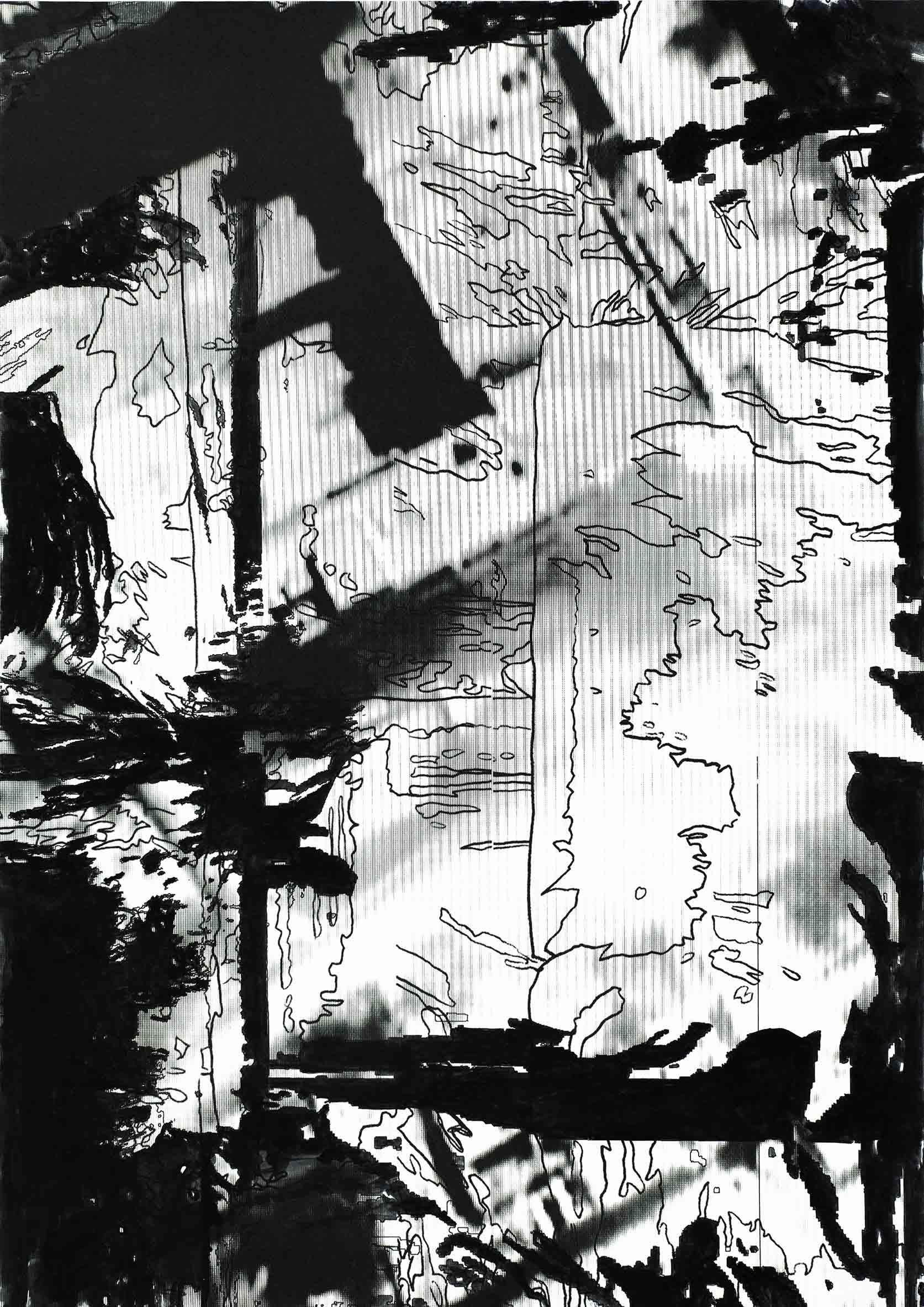
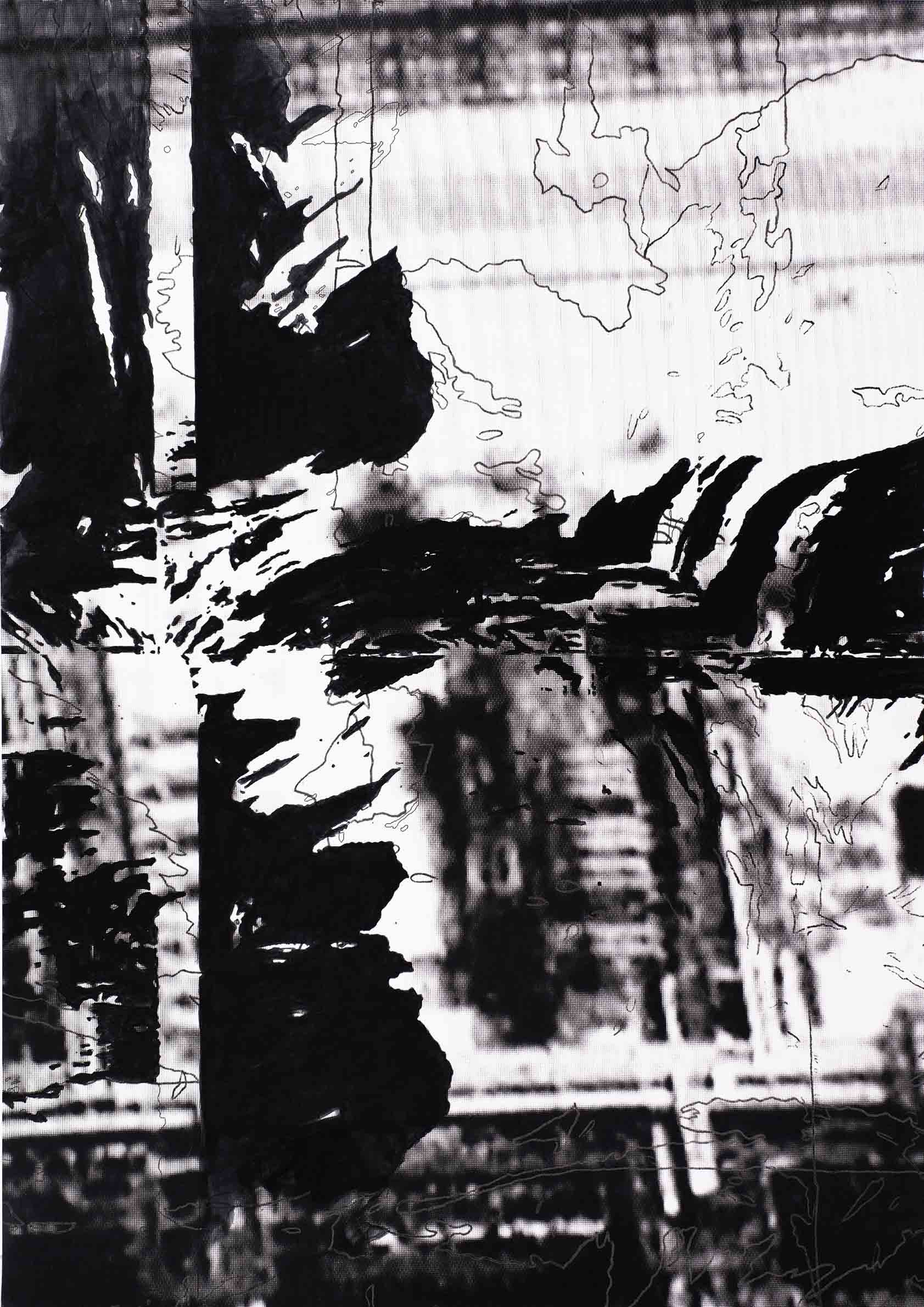
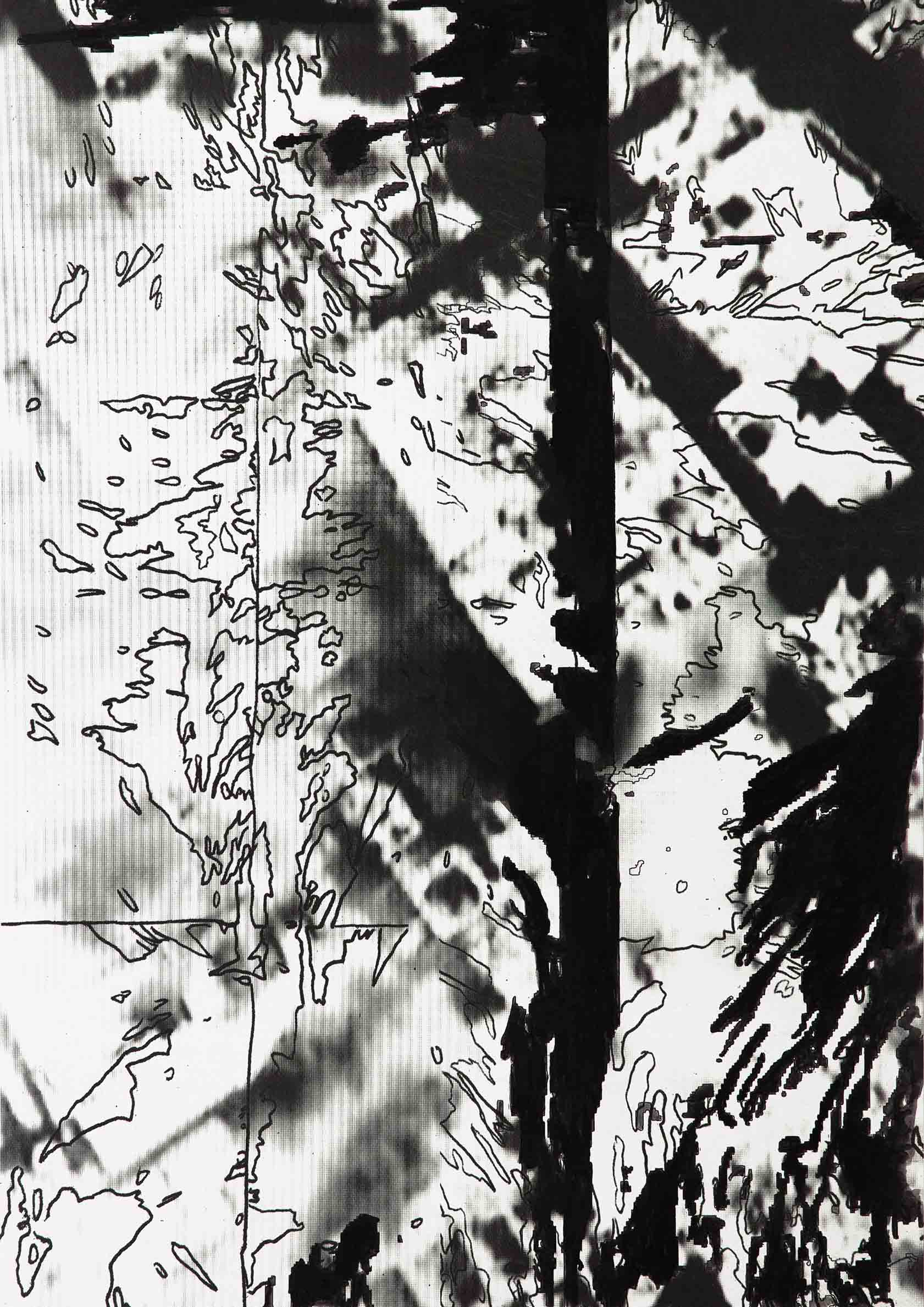

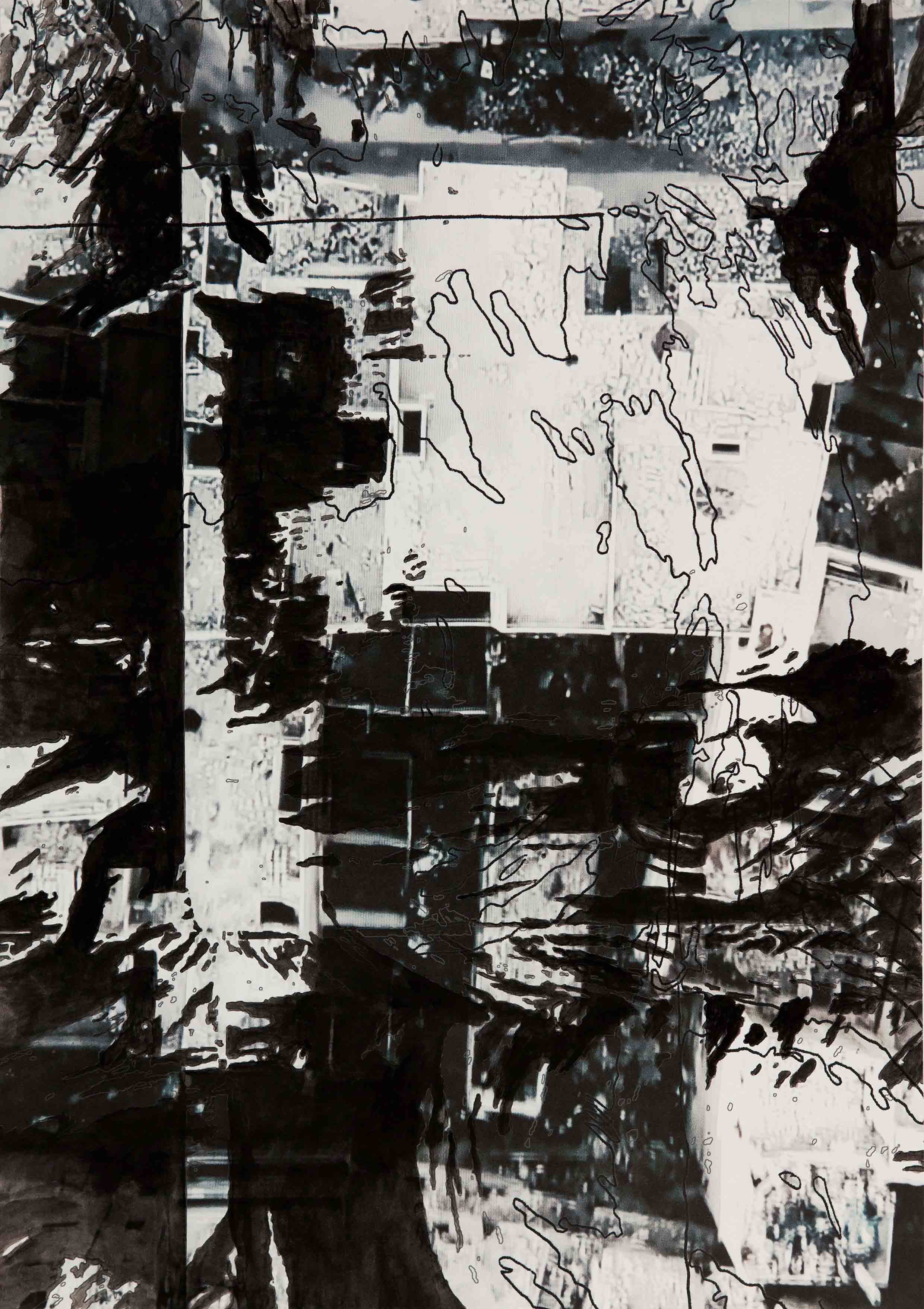
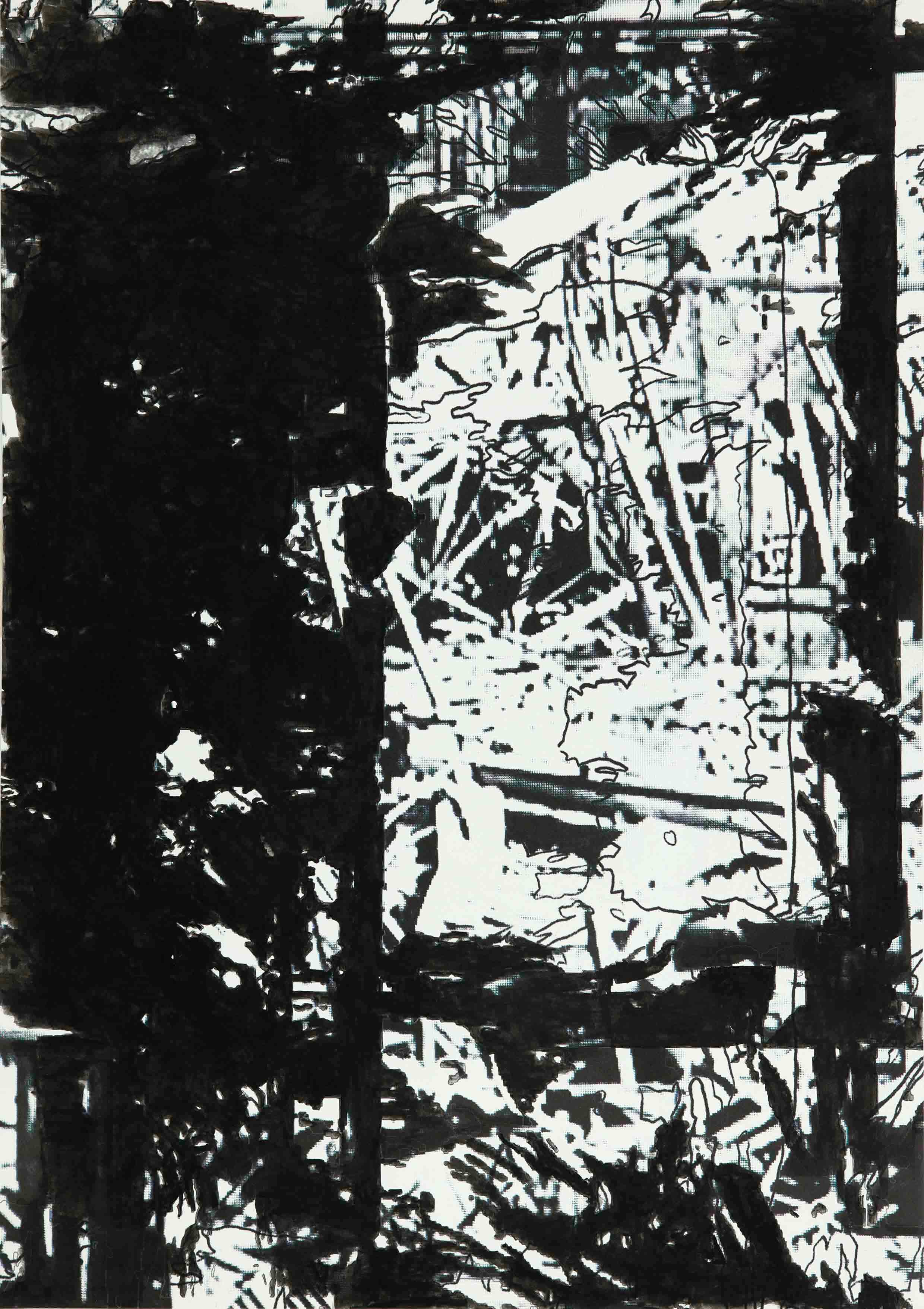
MINDMAP is an attempt to approach destroyed places.
The starting motifs for the series of works MINDMAPS are media images from the ARCHIVE ONETHIRTY of places destroyed by politically motivated events. Fragments of buildings, urban structures seem like traces and fragments of memories. The ink works MINDMAPS link digital and analog work processes so closely that they are mutually dependent and one cannot be thought of without the other. Based on the digital processing of the photographic template, the binary code 0 and 1, so to speak, details of the photograph are meticulously traced and supplemented with the smallest brush sizes 0 and 1.
Information:
119 x 85 cm
Ink on digital print
The starting motifs for the series of works MINDMAPS are media images from the ARCHIVE ONETHIRTY of places destroyed by politically motivated events. Fragments of buildings, urban structures seem like traces and fragments of memories. The ink works MINDMAPS link digital and analog work processes so closely that they are mutually dependent and one cannot be thought of without the other. Based on the digital processing of the photographic template, the binary code 0 and 1, so to speak, details of the photograph are meticulously traced and supplemented with the smallest brush sizes 0 and 1.
Information:
119 x 85 cm
Ink on digital print
2023 — Video MARIA
Excerpt from the video MARIA
The video shows Maria, born in 1896, one of the many women who experienced four different systems of regime and two world wars and who ultimately had to flee her homeland. Only a few documents from her life have survived. In various drawings based on a photographic portrait from 1914, I take a closer look at her eventful life.
Information:
Full HD
16:9
4,20 Min.
B/W
2020 — Video WORDLESS
Excerpt from the video WORDLESS
In August 2019, American troops left northern Syria, leaving behind a political vacuum. Monika Huber took this unstable situation as an impulse for the video WORDLESS. It shows in 3 chapters, Border, The Observer and Noise different border violations.
Information:
Full HD
16:9
9,22 Min.
2020 — Video THE BIG LAWN
Excerpt from the video THE BIG LAWN
Video installation with 5 monitors and sound - created in the first lockdown 2020.
Dürer's "Great Lawn" is transferred to the present and transformed into the moving image of a real meadow, which slowly but steadily changes. The focus is on a small section, light and shadow create minimal movements. In the view of the detail, the macrocosm of nature is reflected in the microcosm of a meadow and the real in the imaginary and artificial. As (sur)real and fictional irritations, unexpected events and views arise almost unnoticed.
Information:
Full HD
4:3
14 Min.
2019 — Video PASSING THE GARDEN
Excerpt from the video PASSING THE GARDEN
The frescoes of the Villa di Livia, the wife of Emperor Augustus, which can be seen in the Museo Palazzo Massimo in Rome, form the basic motif for the video PASSING THE GARDEN. These frescoes, which are about two thousand years old, show an illusionistic garden space, a "hortus conclusus" with representations of plants, trees and birds. Photographs, video recordings and drawings of the frescoes, are interwoven with photographs and videos of intact and destroyed nature. What appears natural at first glance turns out to be artificially generated. Slowly, the images change their state, moving between reality and fiction. Experimental, meditative music accompanies the transformation process.
Information:
Full-HD
16:9
6,35 Min.
2018 — Video RIOTS
Excerpt from the video RIOTS
The video RIOTS refers to the media coverage that relentlessly presents us with daily images of violent demonstrations and civil war scenes. In a fast sequence, photographs from the archive Einsdreissig are combined with edited video sequences and confront the viewer with the daily visible violence.
Information:
Full-HD
16:9
7,12 Min.
July 28, 2023 – January 28, 2024
PaintingPhotography
Zentrum für Gegenwartskunst im Glaspalast
Zentrum für Gegenwartskunst im Glaspalast


PaintingPhotography examines artistic concepts at the intersection of photography and painting. The blending and overlapping of the two spheres has long since generated transitions that are superficially barely perceptible, and not only on a technical level. The visual portfolios of artistic pictorial invention are increasingly dissolving categorizations based on classical standards in favor of new image forms, in which theoretical reflection, poetry, and new associative spaces are in the process of being created. Dissolution as well as expansion are equally poles that capture and develop the intertwining of photographic and painterly images to a greater extent. Twelve artists from France, Great Britain, Israel, Germany and the USA present ‘pure’ as well as cross-media works of art from photography, painting and video.
With: Roni Ben Porat ∙ Philipp Goldbach ∙ Monika Huber ∙ Karen Irmer ∙ Kotek ∙ Claire Laude ∙ Zoe Leonard ∙ Richard Prince ∙ Kerstin Skringer ∙ Rosemarie Trockel ∙ Troika ∙ James White
Curated by Thomas Elsen
Beim Glaspalast 1, D-86153 Augsburg
Link to the exhibiton
With: Roni Ben Porat ∙ Philipp Goldbach ∙ Monika Huber ∙ Karen Irmer ∙ Kotek ∙ Claire Laude ∙ Zoe Leonard ∙ Richard Prince ∙ Kerstin Skringer ∙ Rosemarie Trockel ∙ Troika ∙ James White
Curated by Thomas Elsen
Beim Glaspalast 1, D-86153 Augsburg
Link to the exhibiton
2021
Galerie der DG, Munich
τραῦμα – Der Körper vergisst nicht (The Body Does Not Forget)
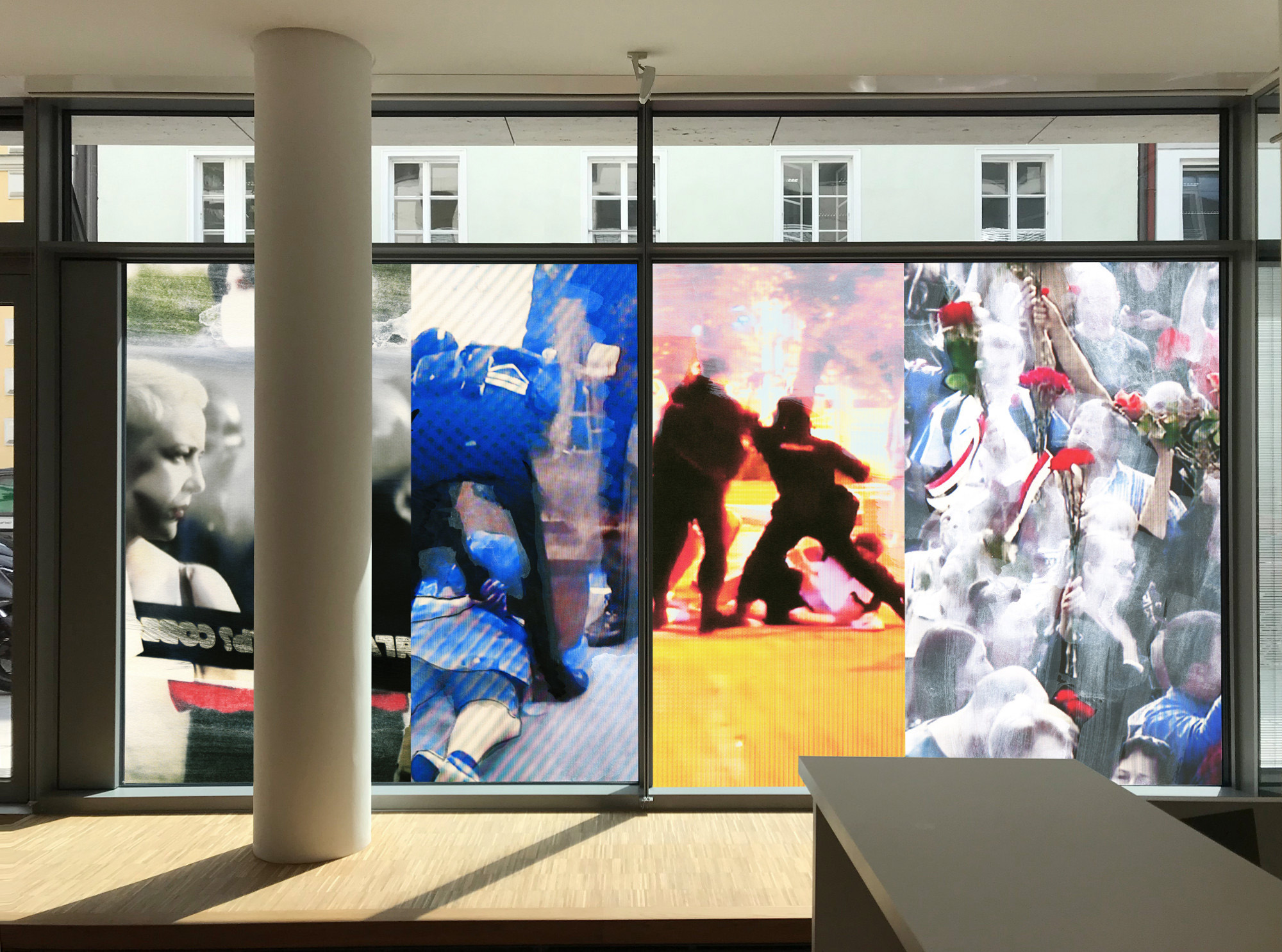
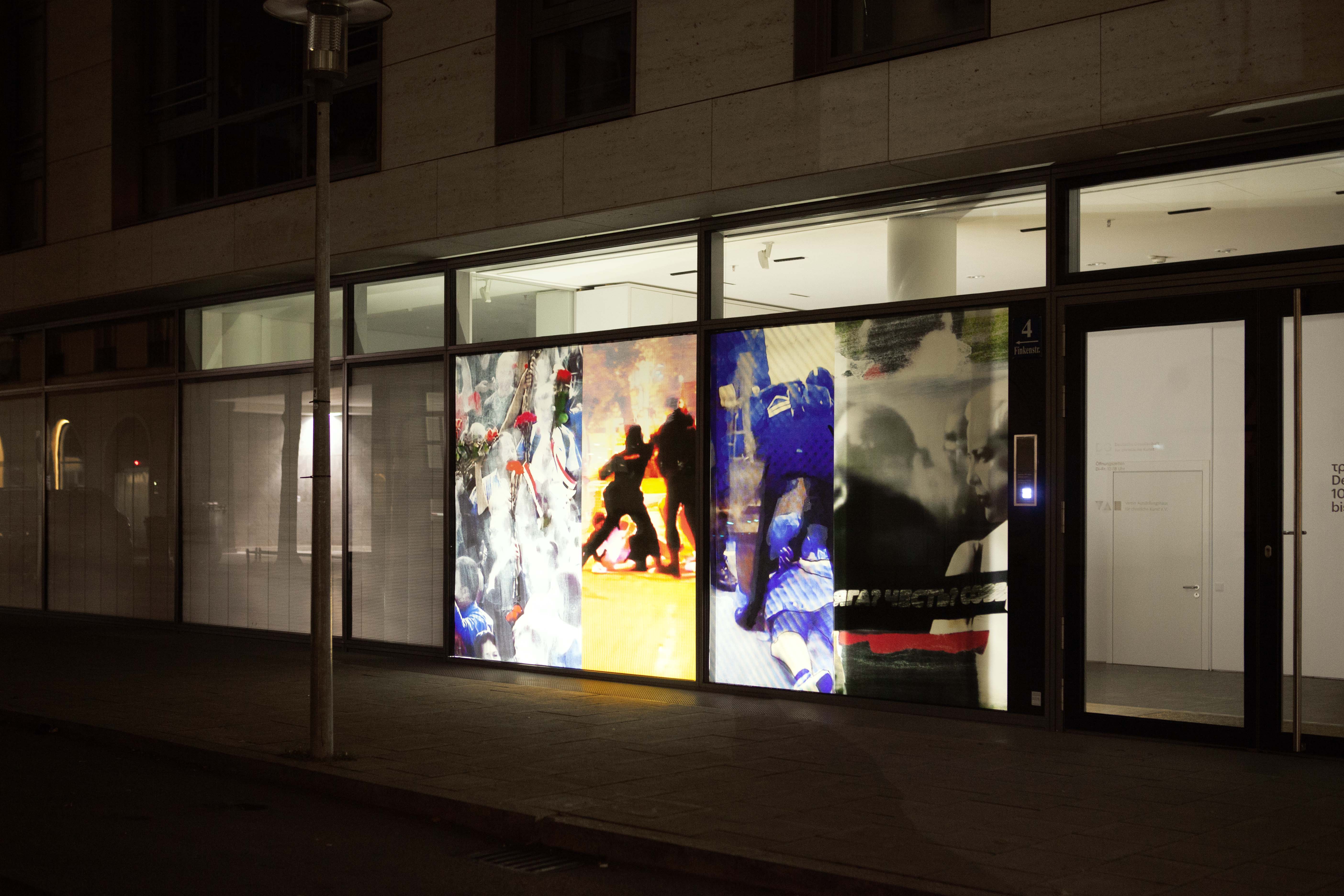
As part of the exhibition τραῦμα - Der Körper vergisst nicht (The Body Does Not Forget), Monika Huber designs the gallery's large display window with protest scenes of the people of Belarus taking to the streets against the government of Lukashenko, whose election victory they do not accept. The nationwide protest drives hundreds of thousands of people to the streets and, in particular, Belarusian women (Maryja Kalesnikawa in the installation) become public figures of peaceful resistance. On September 6, 2021, Maryja Kalesnikawa is sentenced to 11 years in prison. The design of the glass pane with printed blacklight foils creates two different daytime and nighttime situations, during the day the gallery window shines inwards, at night it shines outwards.
PROTEST Belarus, 2021
Digital print on backlit film
Photography/Collage
242 x 522 cm
PROTEST Belarus, 2021
Digital print on backlit film
Photography/Collage
242 x 522 cm
March 7, 2023 – August 27, 2023
Kunstmuseum Magdeburg
Kloster Unser Lieben Frauen
Kloster Unser Lieben Frauen
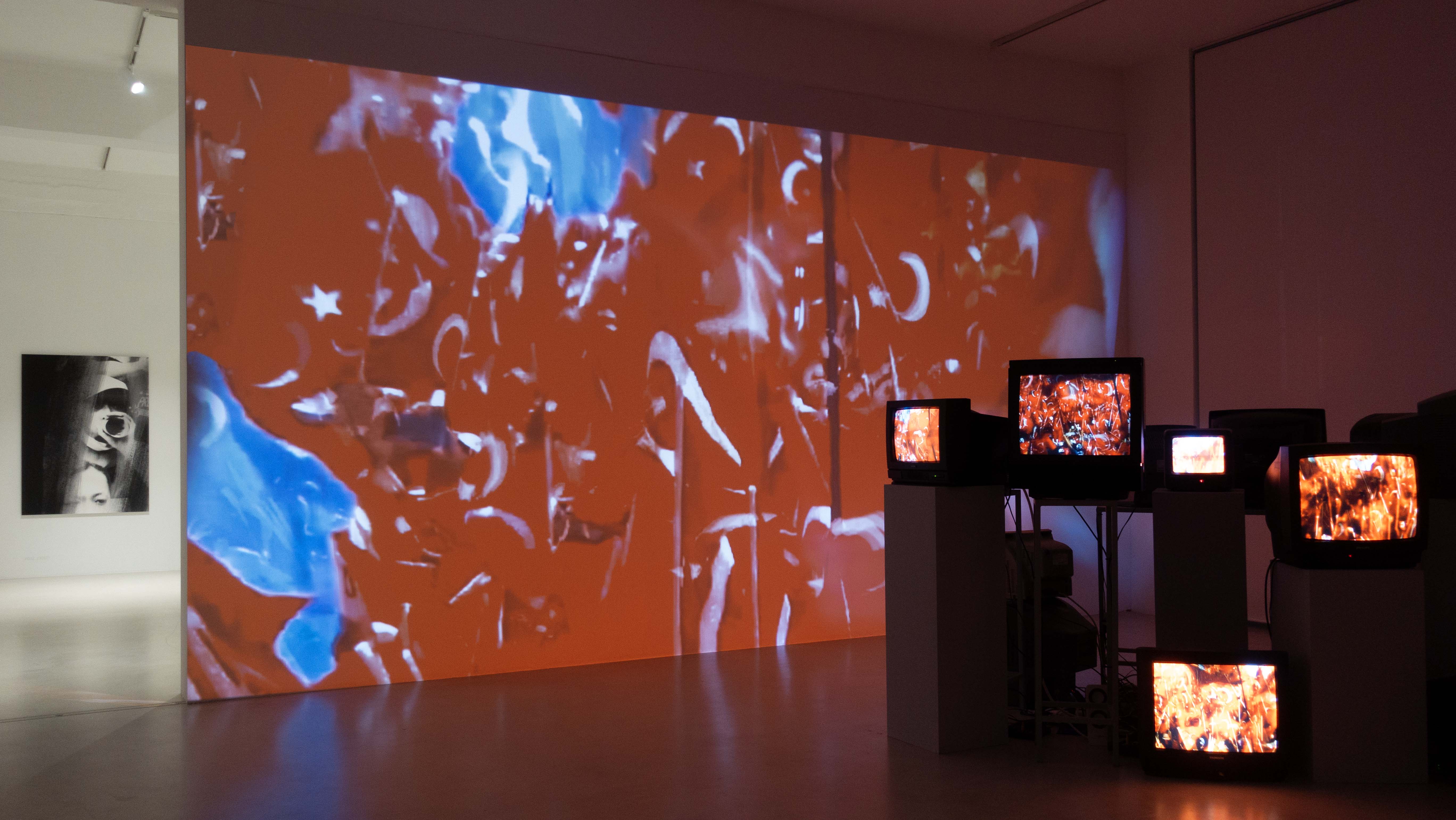
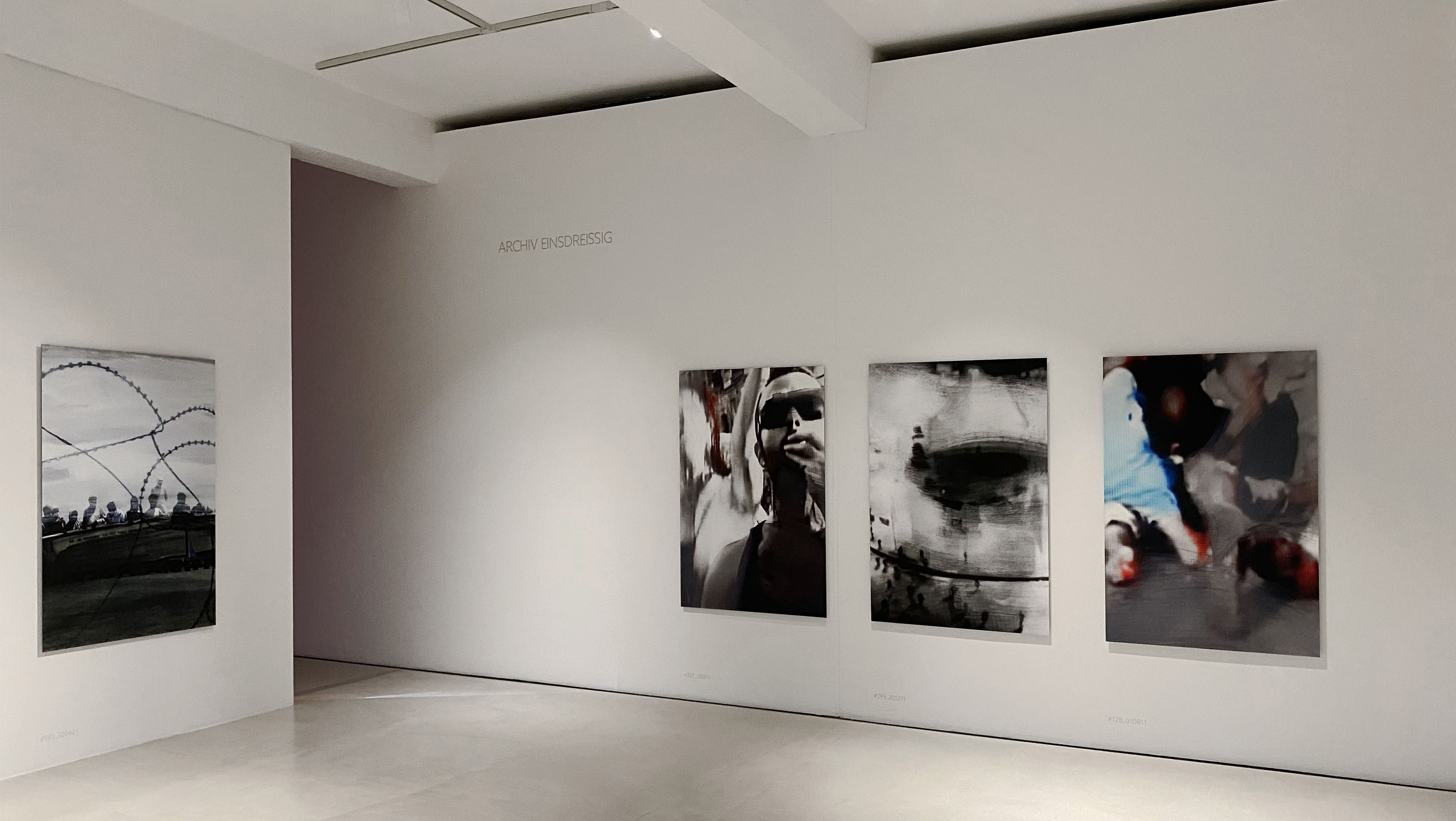
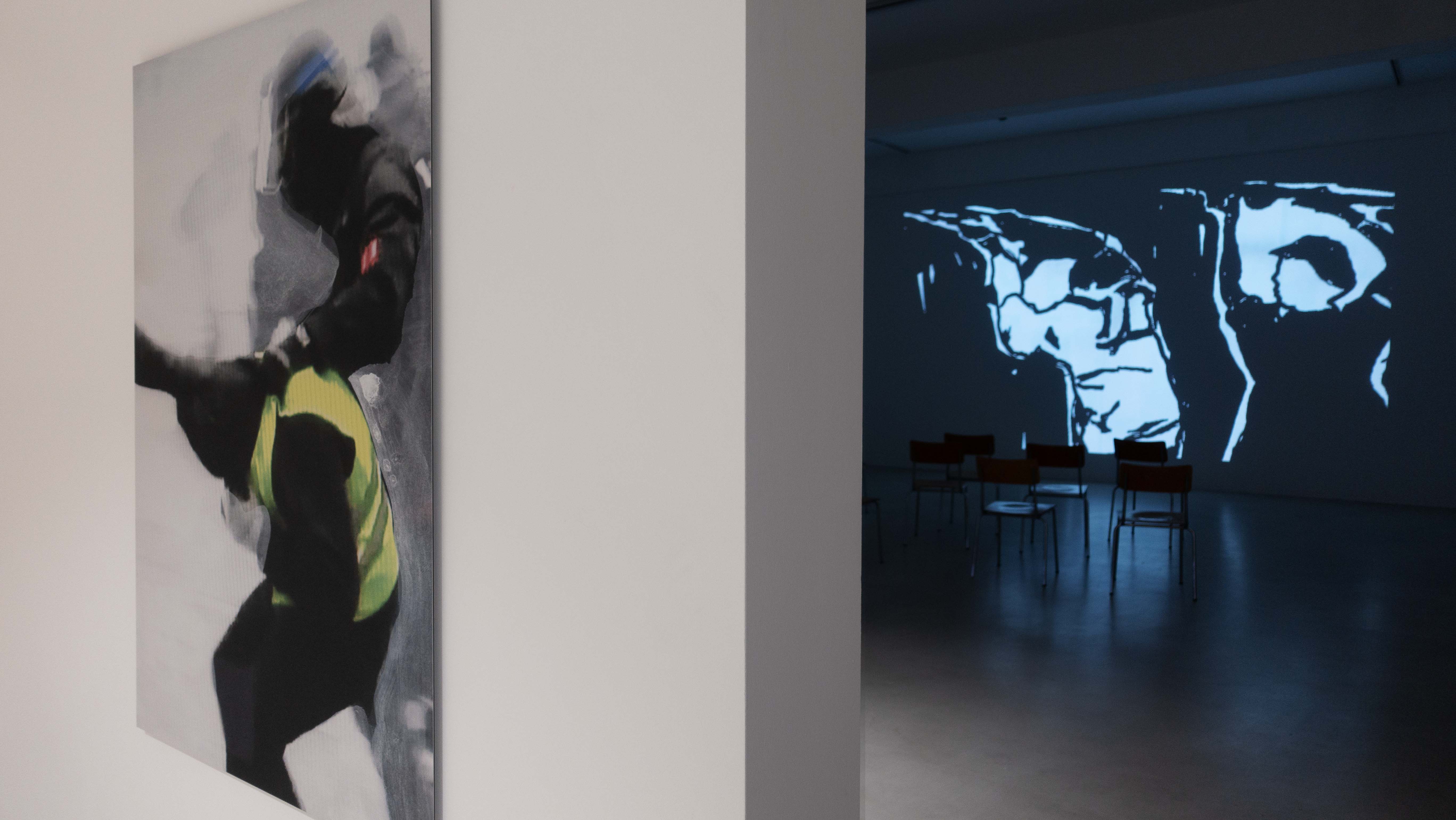
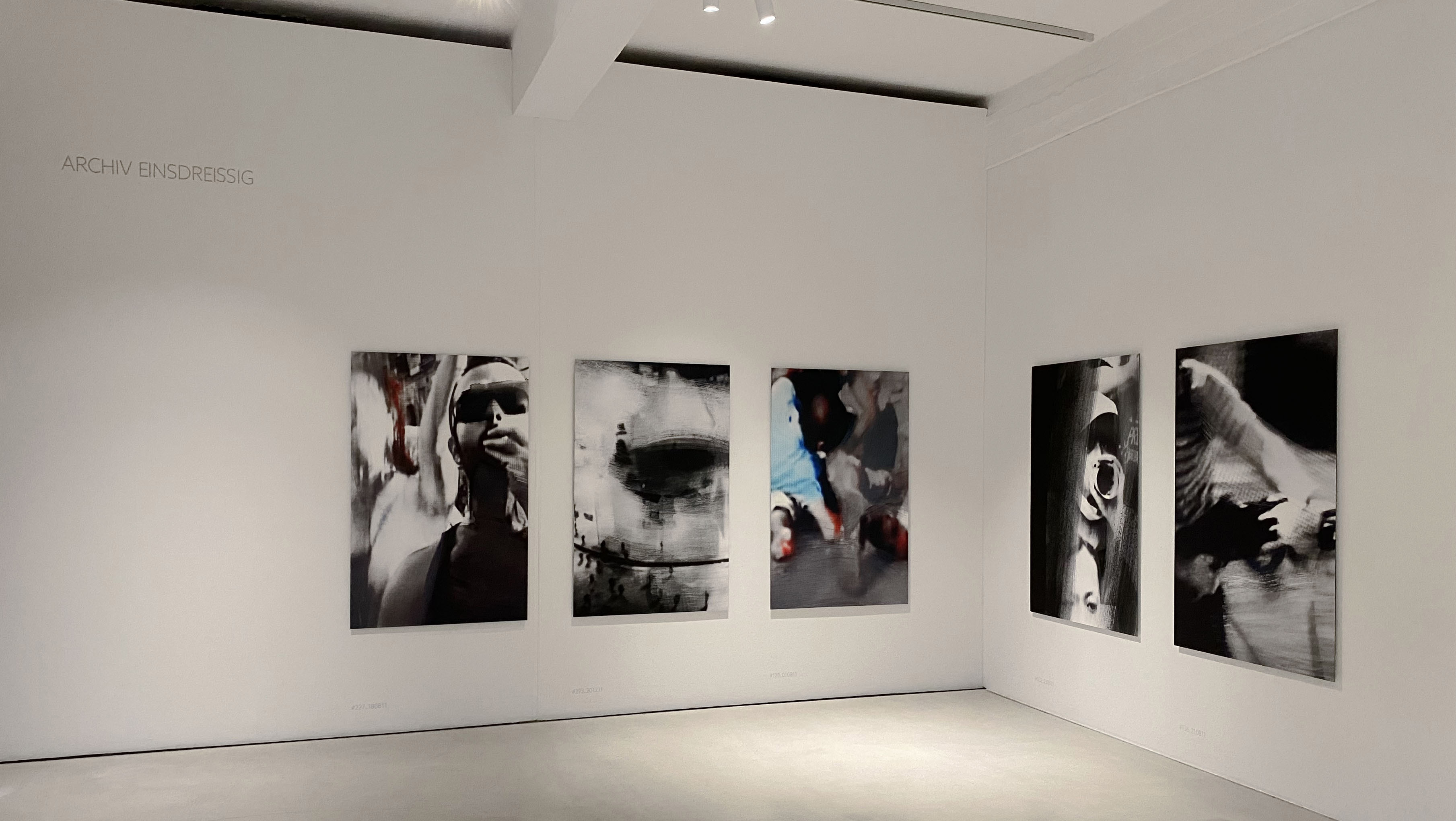
One minute and thirty seconds. That is the average length of a report in a news block such as "Tagesthemen" or "Heute Journal". Monika Huber has been creating a digital archive of news images - the Archive OneThirty - since the beginning of 2011, at the start of the Arab Spring.
The archive documents global political and social change in its media reflection and image narrative construction. Conceived as a long-term documentation, it currently comprises around 40,000 photographs. Huber has selected images from these, edited them by overpainting or drawing them, or transformed them into a video. In doing so, the artist picks up on images that are usually lost in the daily flood of news, in order to make them visible, tangible and reflective in a new way by editing them. The media images she selects repeatedly show people as protesting and revolting actors, as subjects and objects of political and public, often violent and warlike events.
Regierungsstr. 4-6, D-39104 Magdeburg
Link to the exhibition
The archive documents global political and social change in its media reflection and image narrative construction. Conceived as a long-term documentation, it currently comprises around 40,000 photographs. Huber has selected images from these, edited them by overpainting or drawing them, or transformed them into a video. In doing so, the artist picks up on images that are usually lost in the daily flood of news, in order to make them visible, tangible and reflective in a new way by editing them. The media images she selects repeatedly show people as protesting and revolting actors, as subjects and objects of political and public, often violent and warlike events.
Regierungsstr. 4-6, D-39104 Magdeburg
Link to the exhibition
2021
Urban Screening in Sydney, Melbourne, Brisbane, Australia
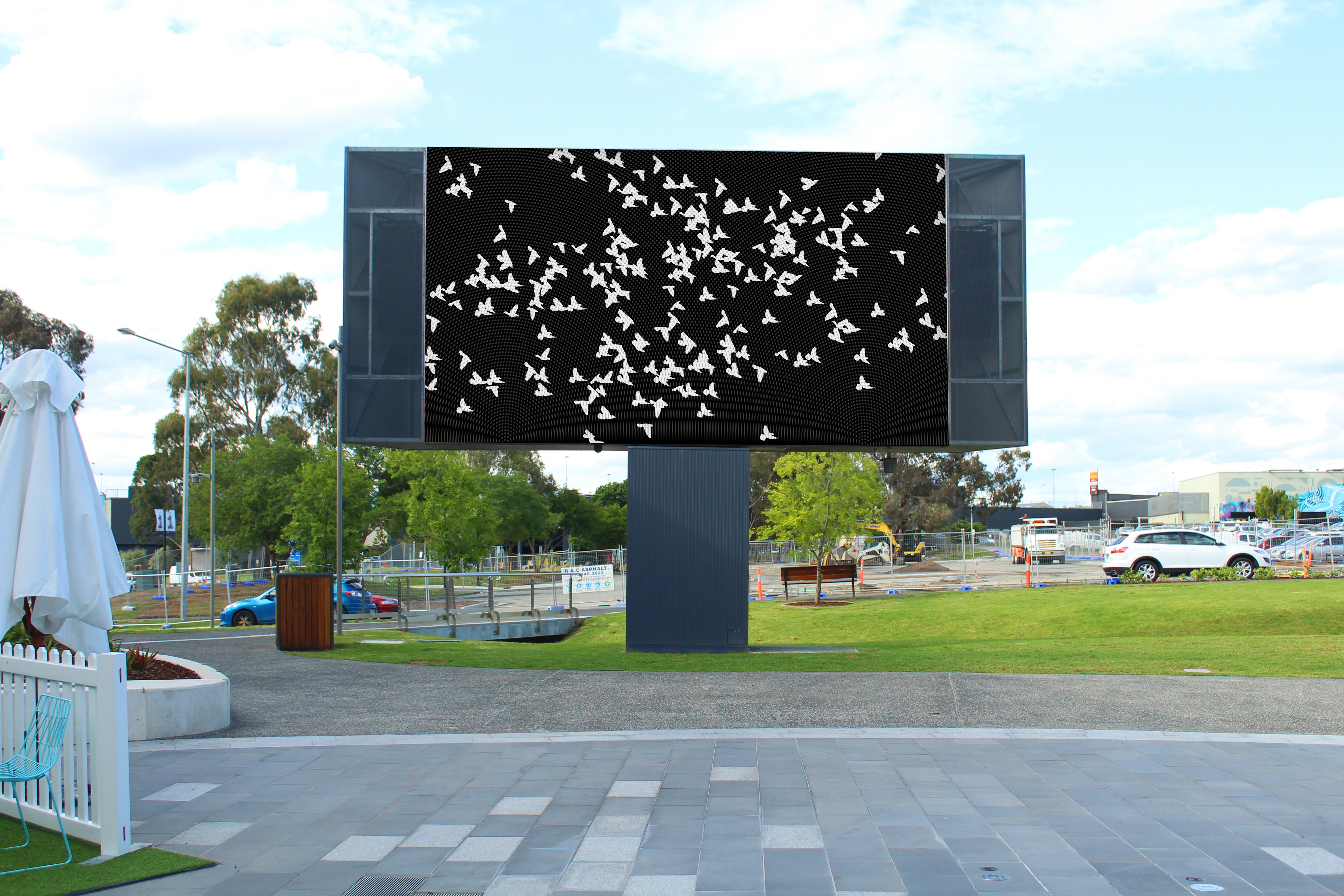
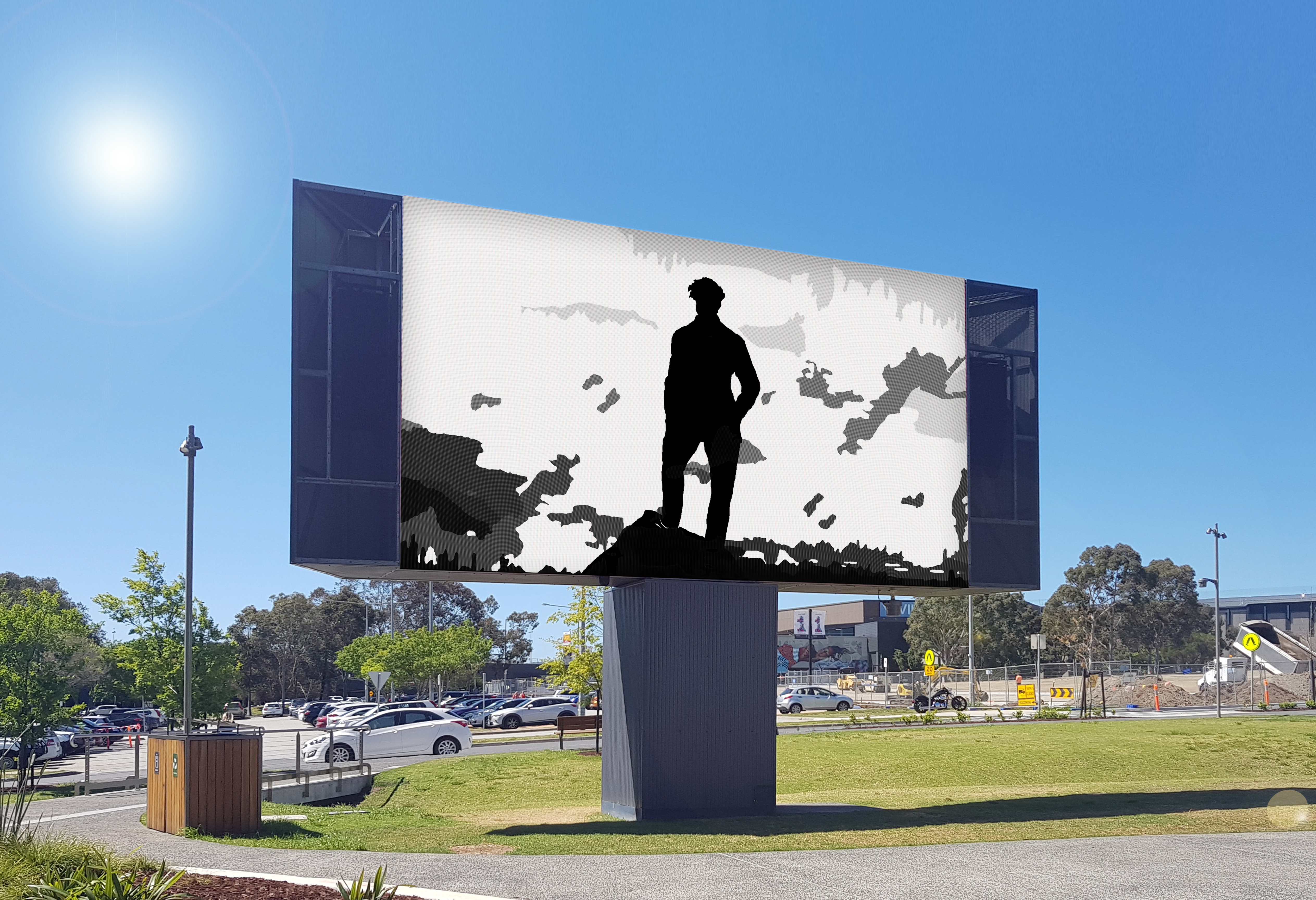
From May 1 to June 30, 2021, the videos CAMOUFLAGE and PASSING THE GARDEN will be shown on public screens in the middle of the Australian cities of Melbourne (Bunjil Place 1) and Sydney (Macquarie Mall Liverpool).
Video CAMOUFLAGE,
Full-HD, 16:9
3 Min., B/W
Video CAMOUFLAGE,
Full-HD, 16:9
3 Min., B/W
2020
Kunstverein Rosenheim
All along the Watchtower

In the exhibition All along the Watchtower, Monika Huber shows her video work MOONSTAR in a space-filling installation. The video MOONSTAR was created after the attempted coup in Turkey and the protest event organized by the Turkish government on August 7, 2016. The Turkish population waved thousands and thousands of Turkish flags - white crescent and stars on a red background - in support of the Turkish government, creating a huge sea of red flags. MOONSTAR is projected onto the entire wall surface, enveloping the space in flickering red light. The video is contrasted with a smaller projection of the video RIOTS.
2000
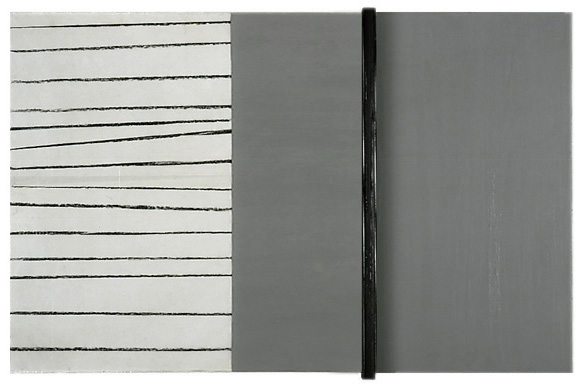
Charcoal on parchment, oil on plexiglass, steel, total 60 x 92 cm, 2000
Private collection
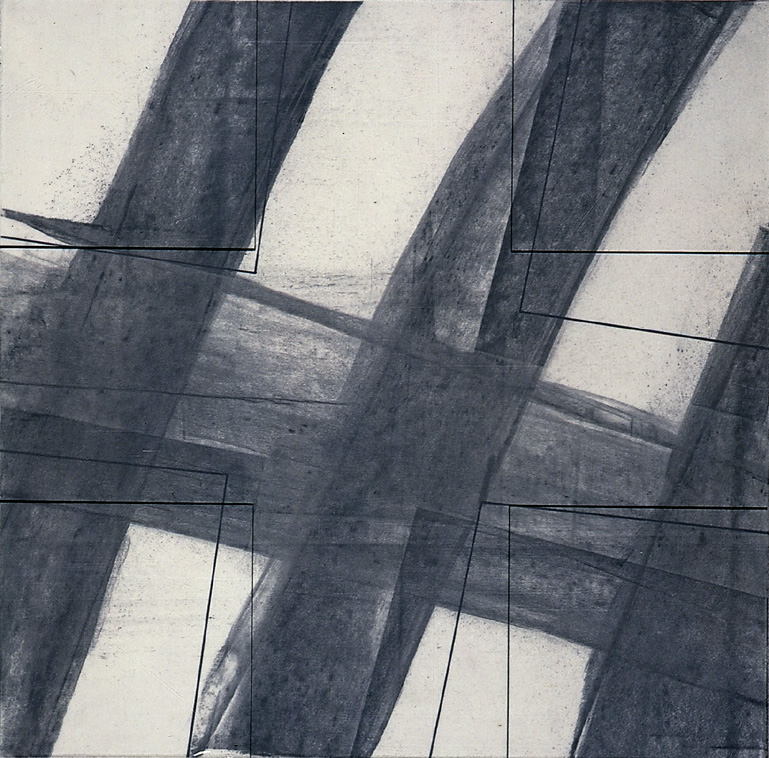
Charcoal on parchment, plexiglass, total 54 x 54 cm, 2000
Private collection
Private collection
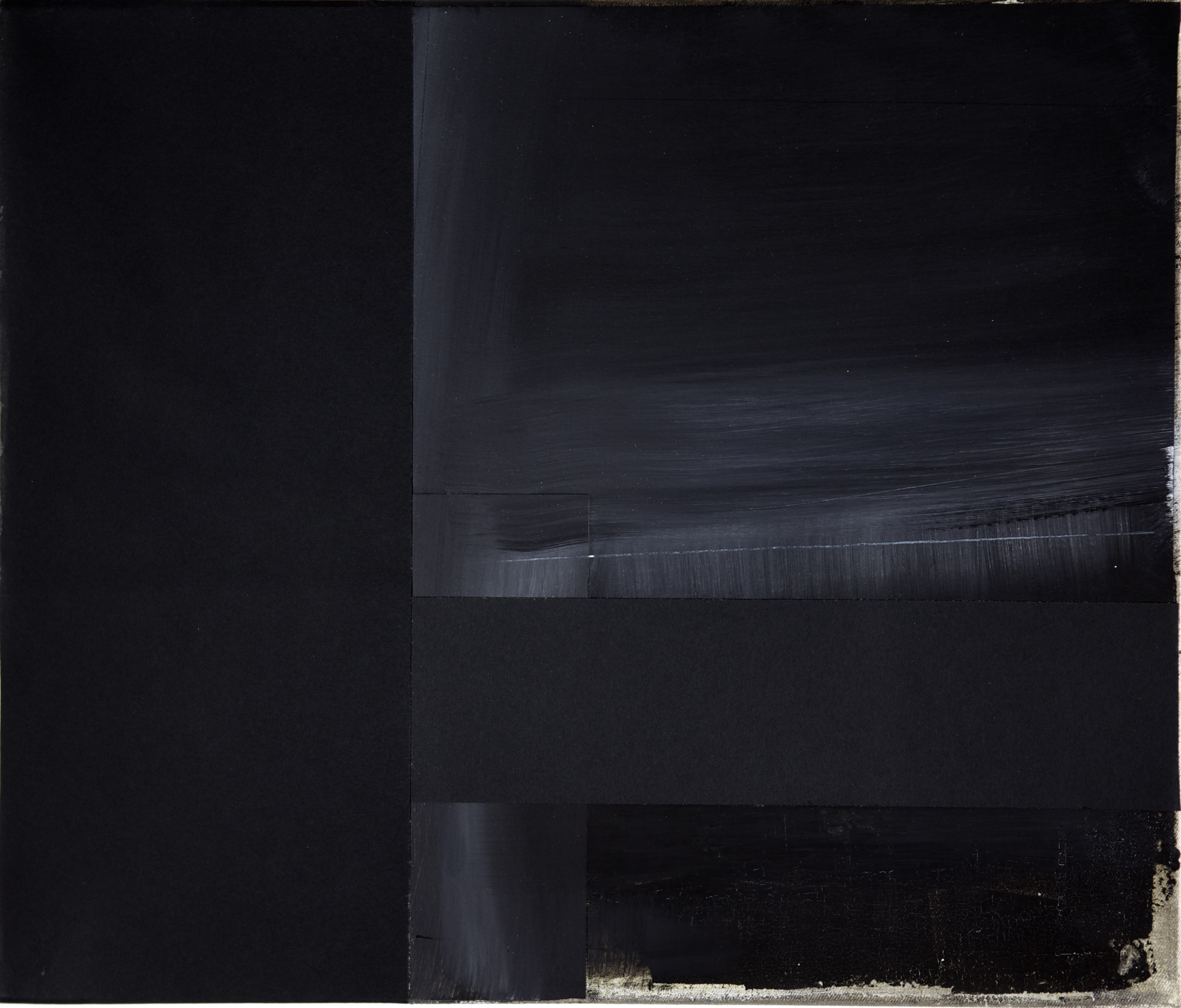
Paper/oil on nettle, 34 x 40 cm, 2001
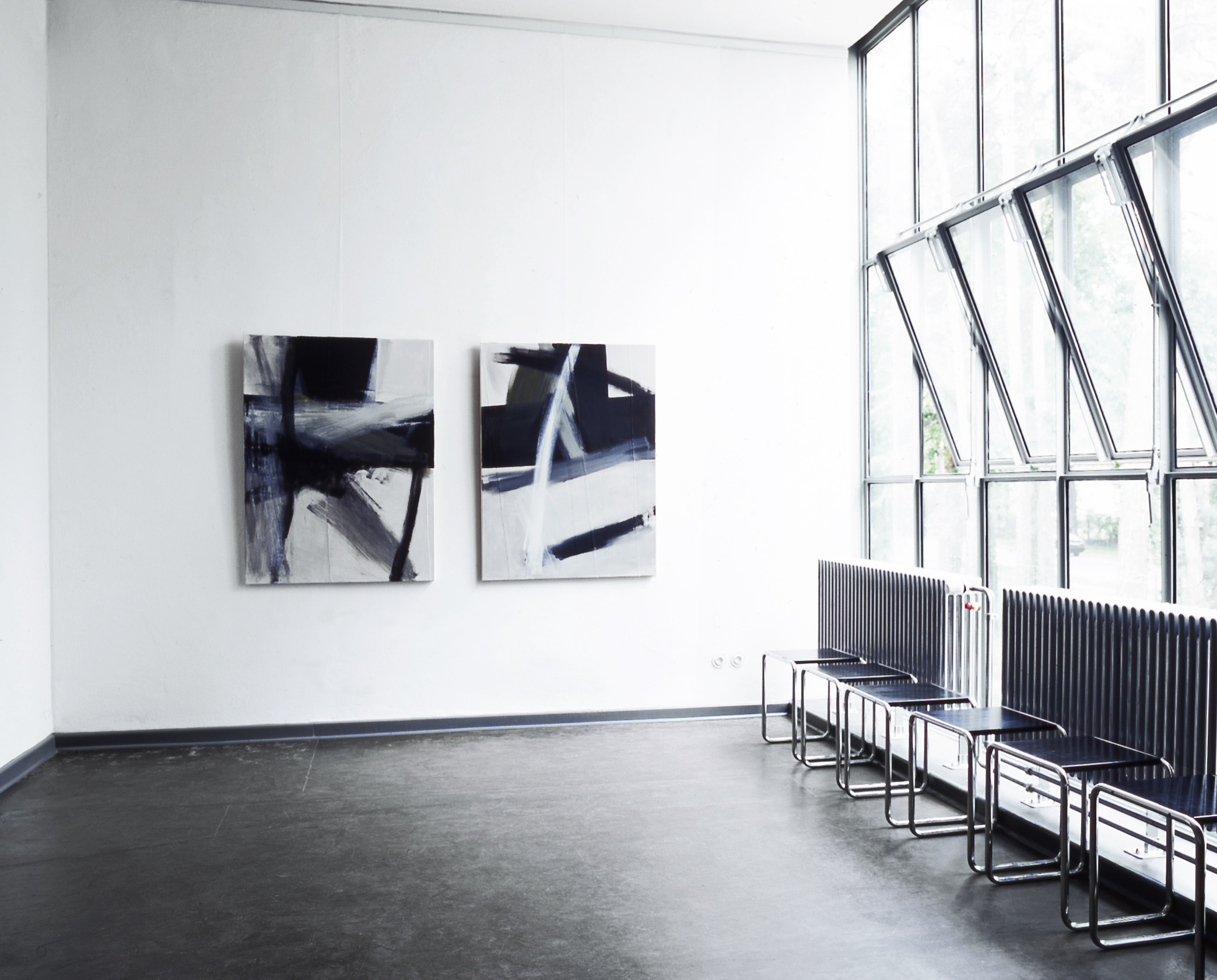
Exhibition view, Bauhaus, Meisterhaus Muche/Schlemmer, Dessau, 2003

Exhibition view, Rosa Atelierhaus, Munich, 2006
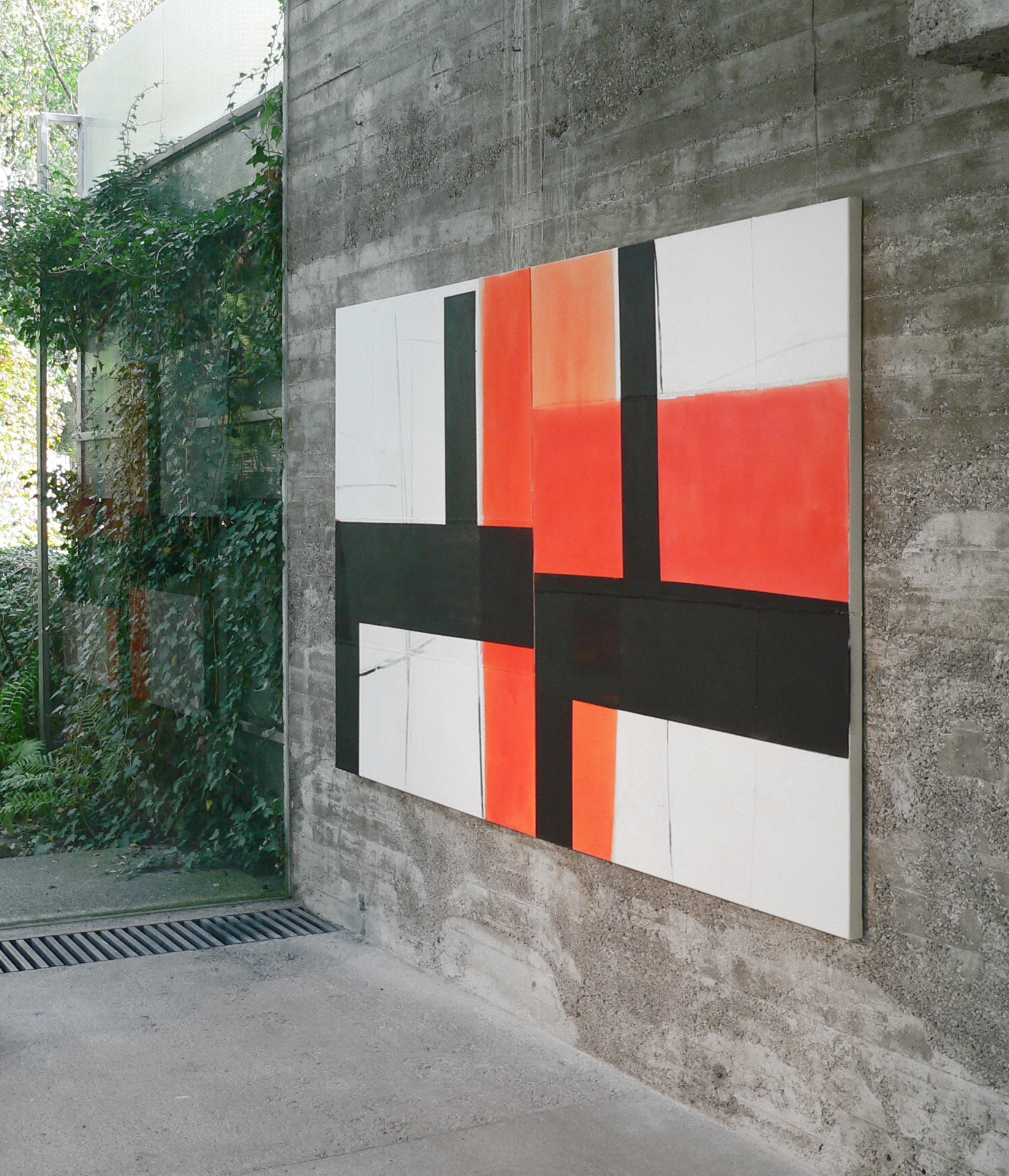
Exhibition view, Rosa Atelierhaus, Munich, 2006
Kunstsammlung Europäisches Patentamt, Munich
Kunstsammlung Europäisches Patentamt, Munich
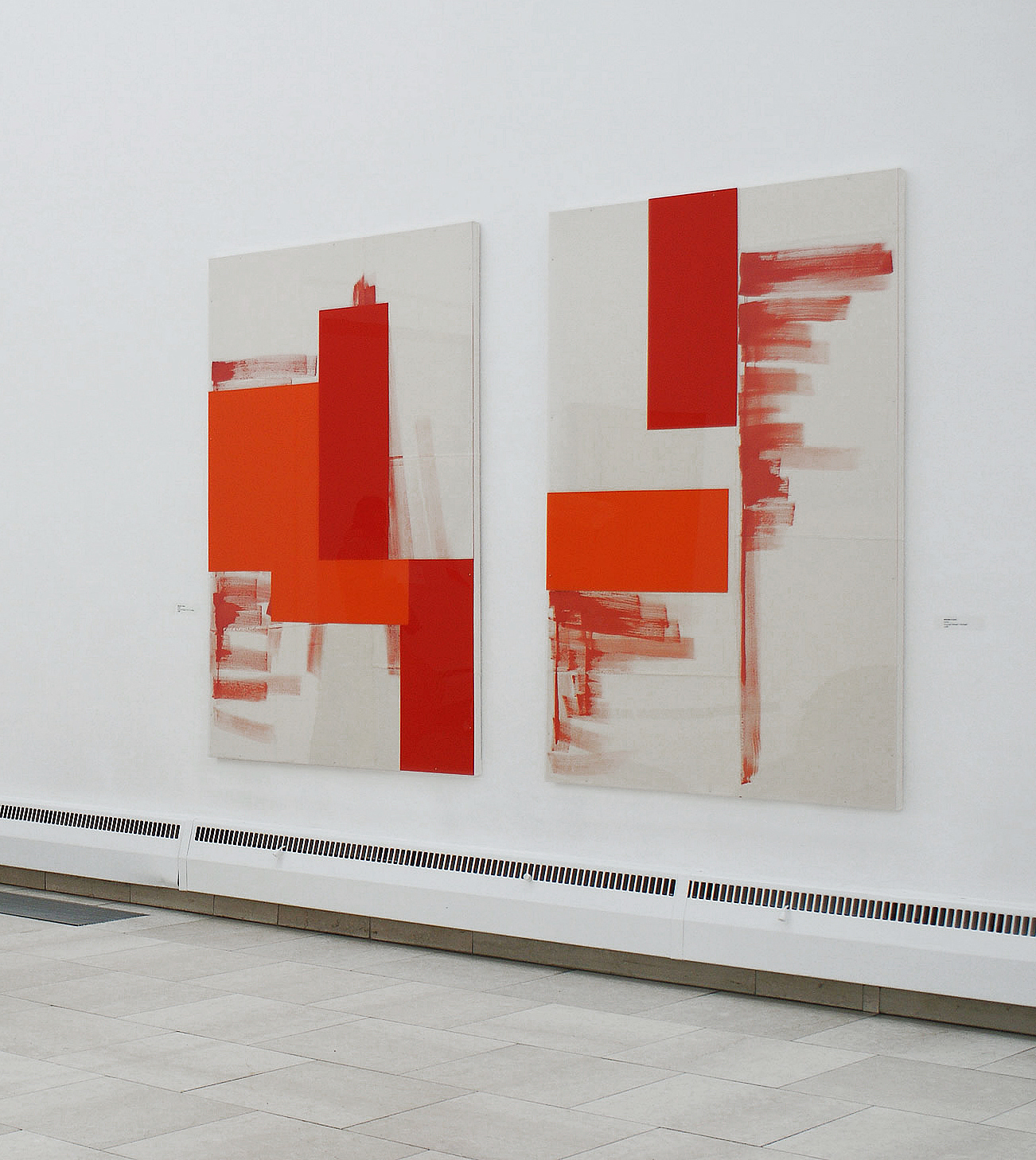
Exhibition view, Städtische Galerie Rosenheim, 2009
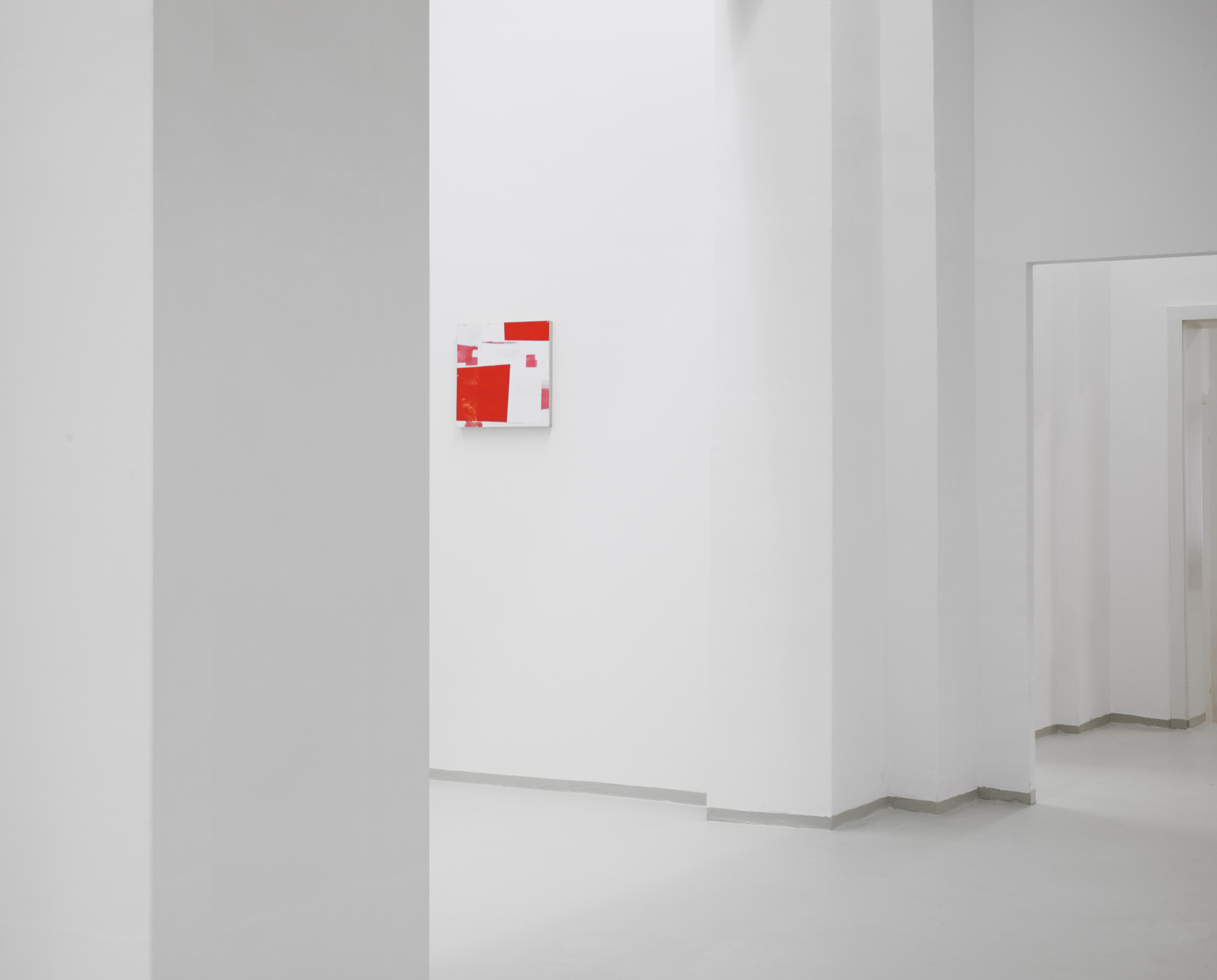
Exhibition view, Neue Galerie Dachau, 2010
Private collection

Exhibition view, Steel and Mirror, 2010
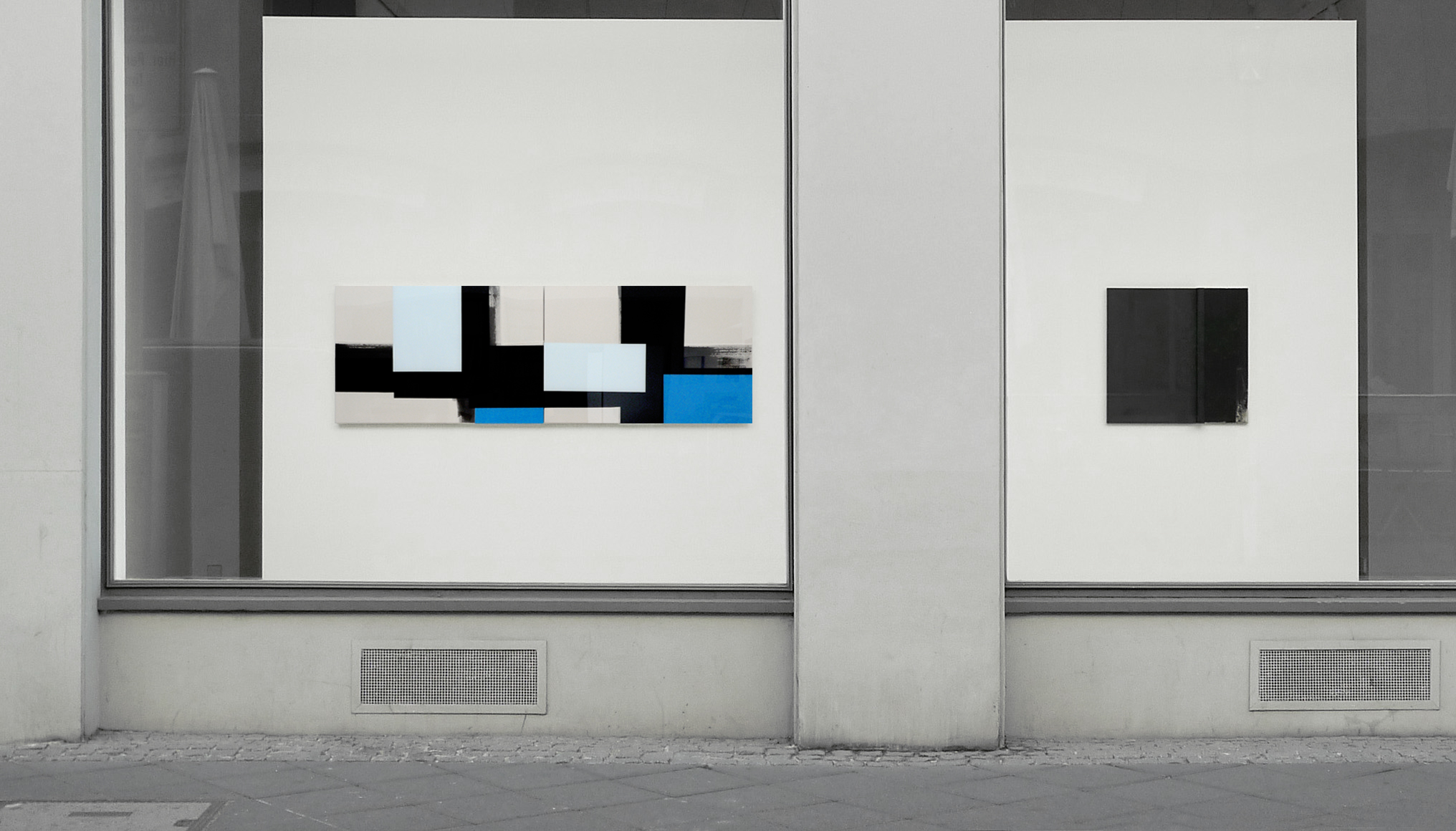
Exhibition view, Galerie Friedrich Müller, Frankfurt/Main, 2020
 Installation view, studio, 2010
Installation view, studio, 20101990
 Exhibition view, von der Heydt-Museum, Wuppertal, 1990
Exhibition view, von der Heydt-Museum, Wuppertal, 1990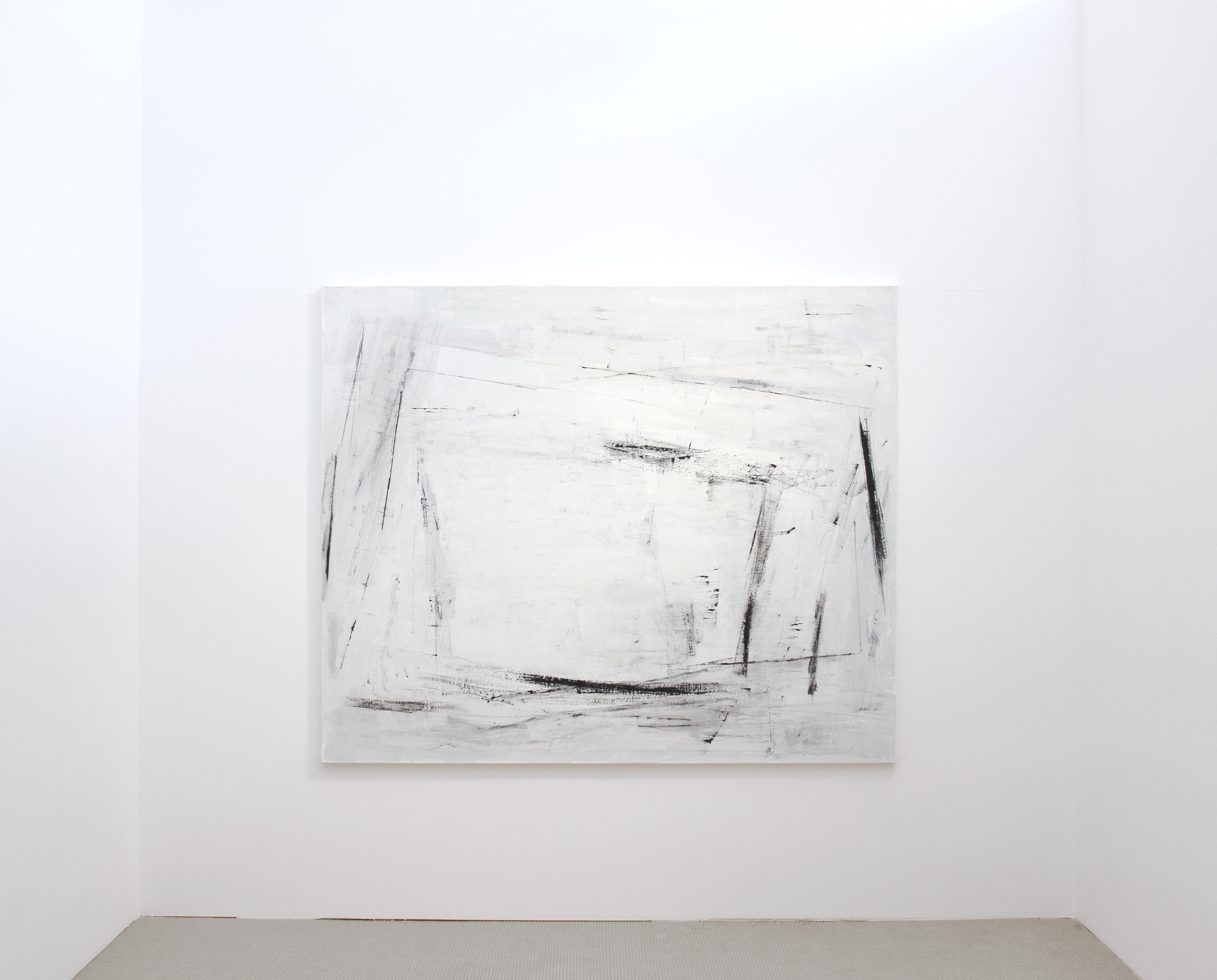
Exhibition view, Galerie Friedrich Müller, Frankfurt/Main, 2022
Image © Galerie Friedrich Müller

Exhibition view, Galerie m Bochum, 1993
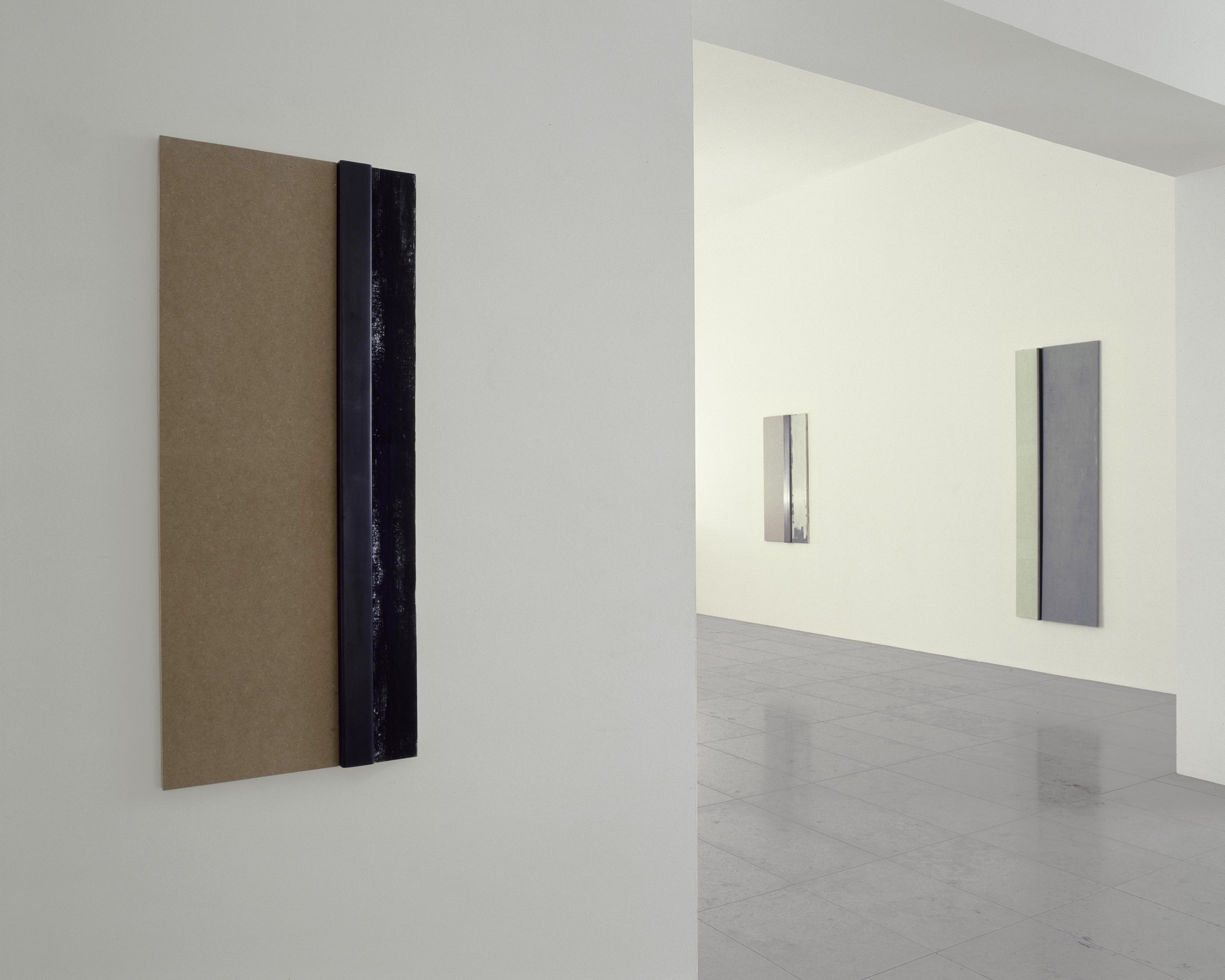
Exhibition view, Museum für Neue Kunst, Freiburg, 1998

Exhibition view, Kunstverein Heidelberg, 1998
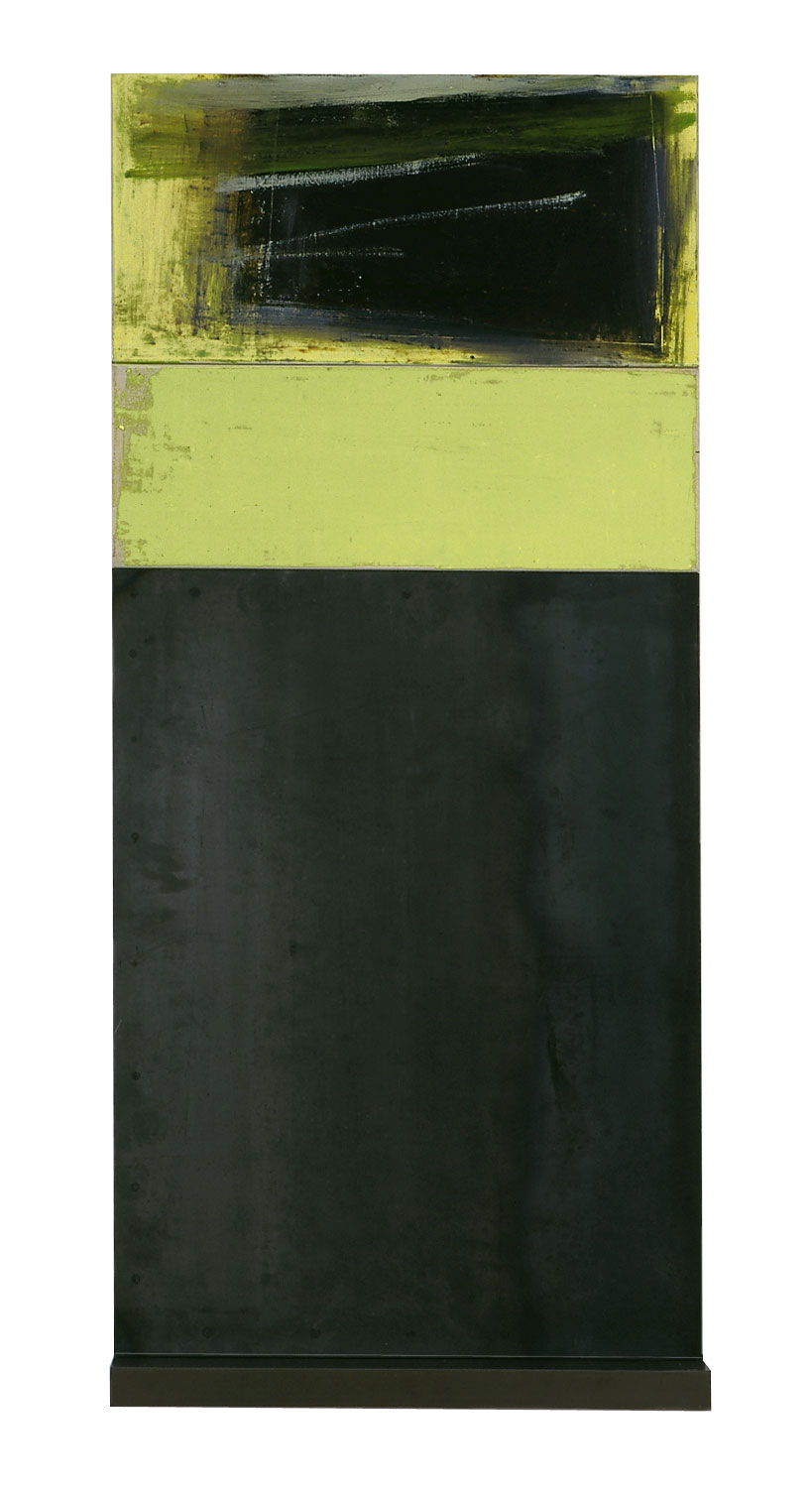
Steel, oil/nettle, 4-part,
total 130 x 60 cm, 1998
Private collection
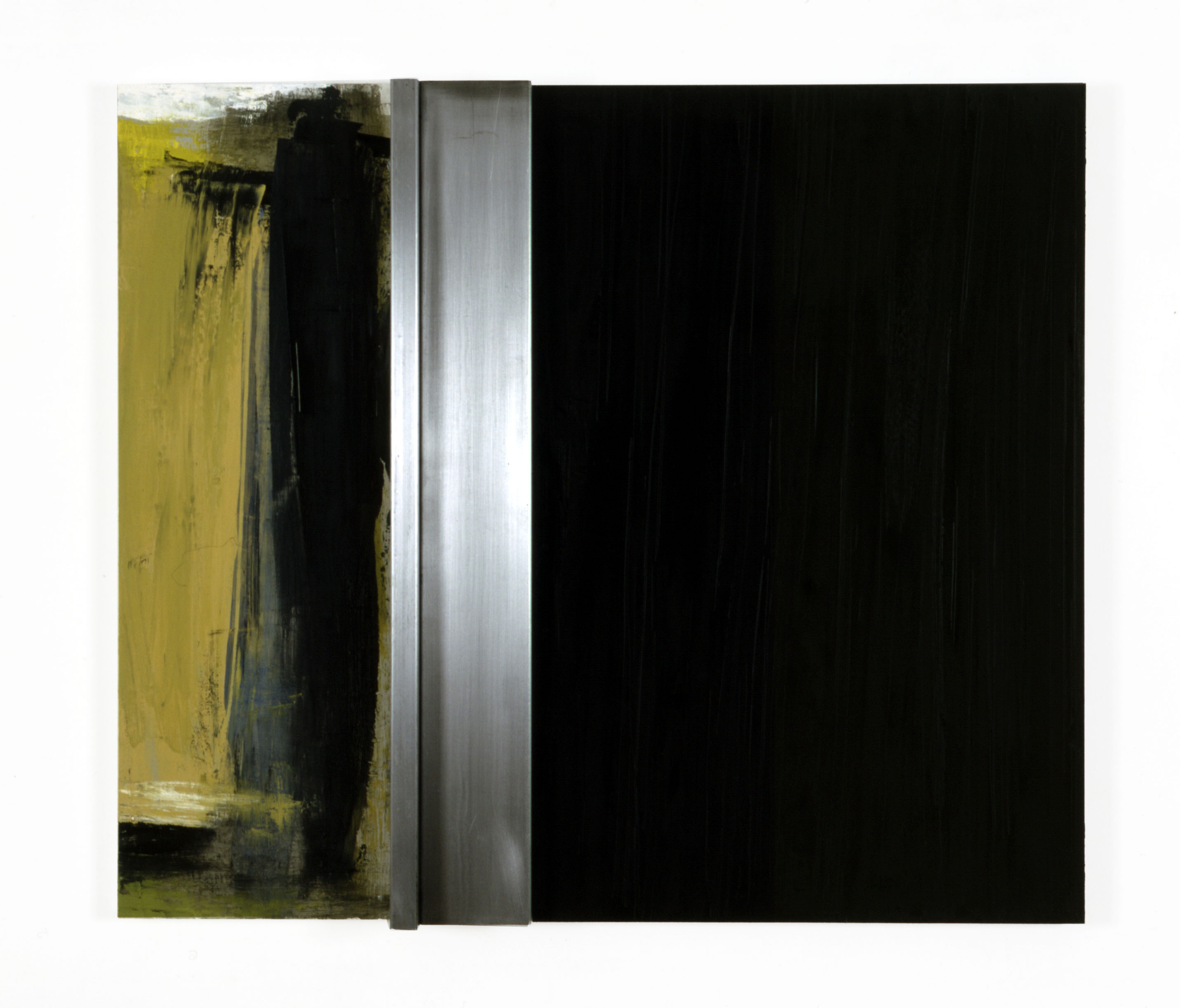
Steel, oil/wood
4 parts, total 60 x 70 cm, 1998
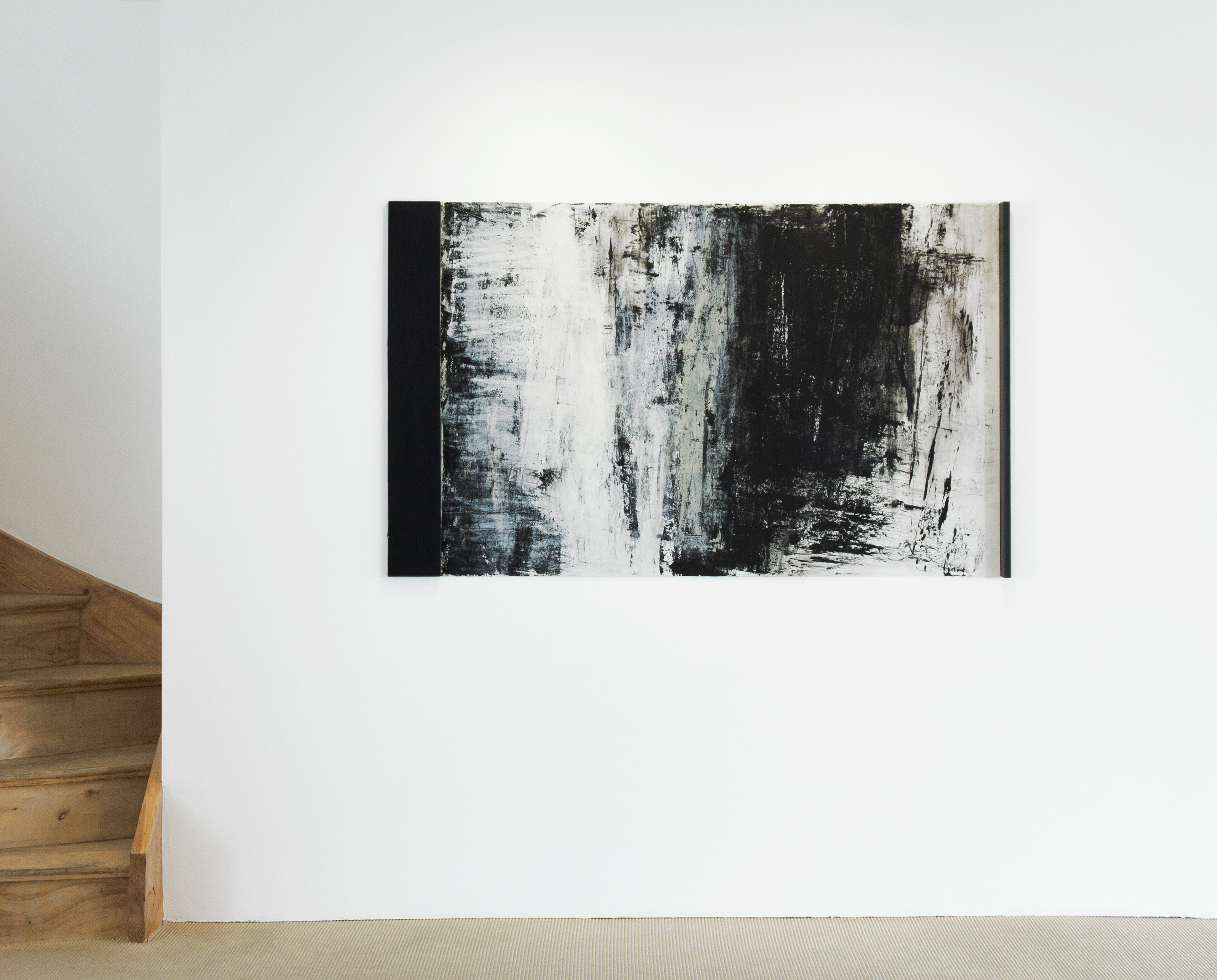
Exhibition view, Galerie Friedrich Müller, Frankfurt/Main, 2020
Image © Galerie Friedrich Müller
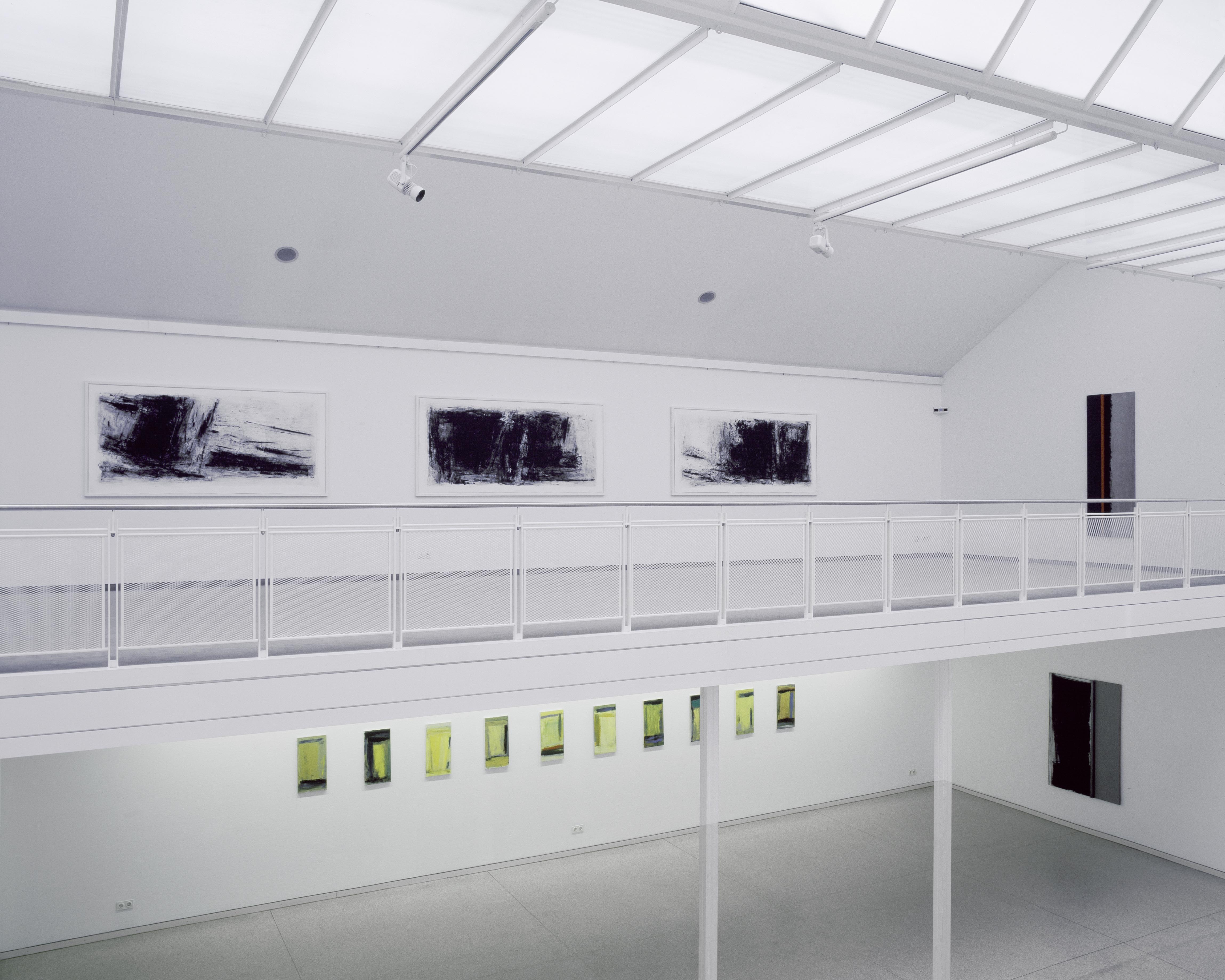
Exhibition view, Kunstverein Heidelberg, 1998

Exhibition view, Museum für Neue Kunst Freiburg, 1998
Private collection
Private collection

Exhibition view, Galerie Friedrich Müller, Frankfurt/Main, 2013
Image © Galerie Friedrich Müller
1980
 Exhibition view, Galerie m Bochum, 1987
Exhibition view, Galerie m Bochum, 1987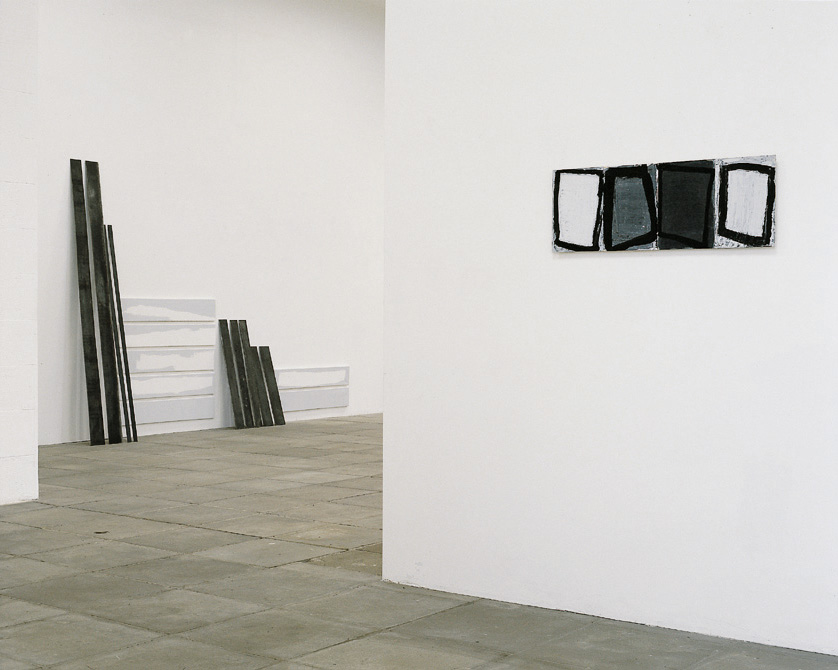
Exhibition view, Galerie m Bochum, 1987
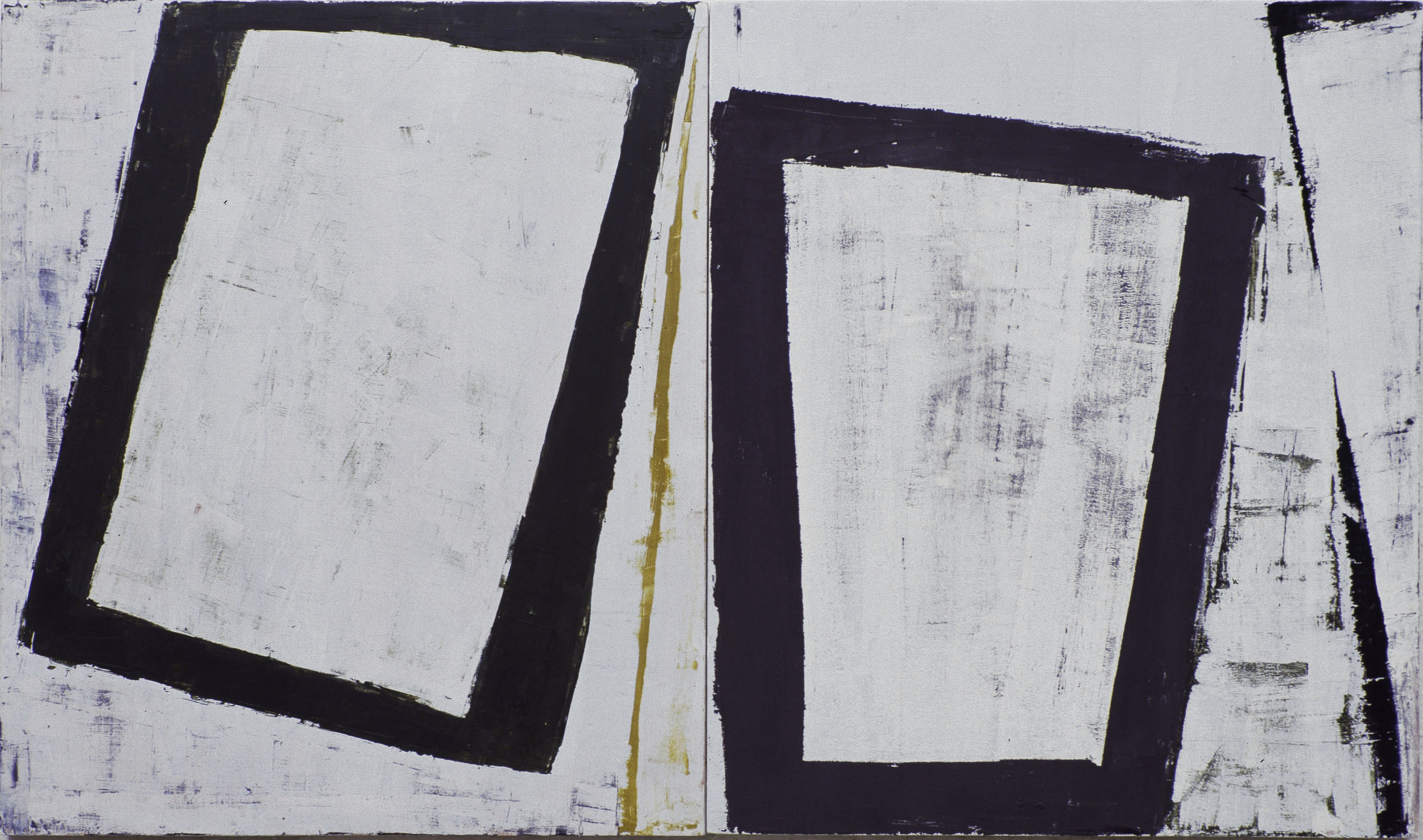
Oil on wood, 2 parts, total 40 x 68 cm, 1987
Private collection
Private collection

Oil on wood, 2 parts, total 50 x 80 cm, 1989
Private collection
Private collection

Oil on nettle, 4 parts, total 50 x 120 cm, 1989

Oil on nettle, 4 parts, total 180 x 150 cm, 1989
Kunstsammlung, Kunstpalast, Düsseldorf
Kunstsammlung, Kunstpalast, Düsseldorf

Oil/charcoal on nettle, 2 parts, total 65 x 100 cm, 1988
Kunstsammlung, Ruhruniversität Bochum
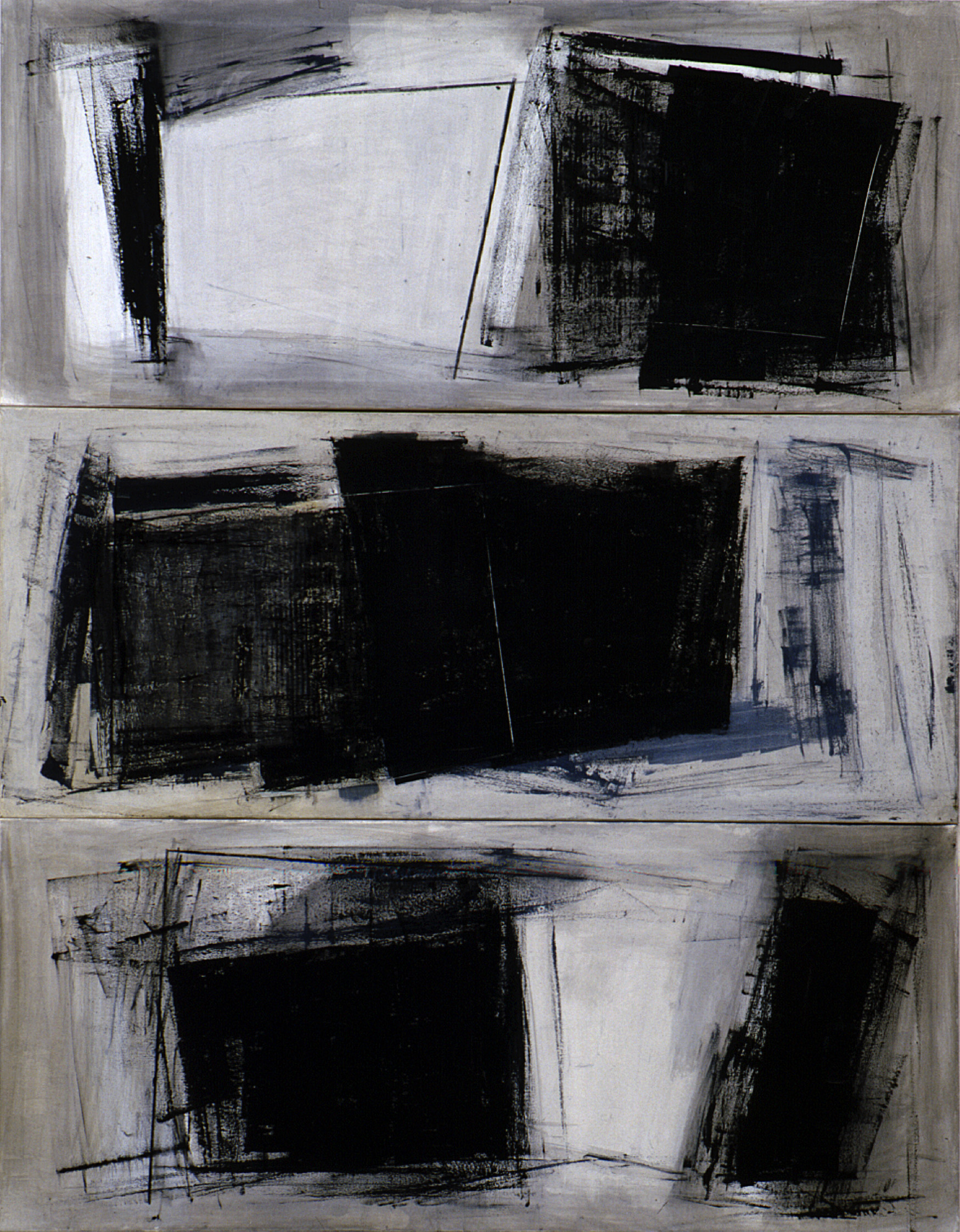
Oil on nettle, 3 parts, total
195 x 150 cm, 1989
Private collection
195 x 150 cm, 1989
Private collection
Studied painting at the Academy of Fine Arts in the class of Prof. Günter Fruhtrunk.
Lives and works in Munich
Since 1985 concrete painting:
For more than "three decades the artist Monika Huber dealt intensively with the main questions of pictorial thinking. In the field of tension between free gestural painting and strict geometric form settings, the master student of Günter Fruhtrunk created a wide-ranging oeuvre, which she consistently developed further in an ongoing process (...) Based on tense contrasts, Monika Huber (...) was concerned with the conflict between the spontaneous, immediate and the systematic, well-calculated, detached from any pictorial object." (Erika Wäcker-Babnik, Munich, 2011)
Since 2011 work on the Archive OneThirty:
From 2011 with the protests in the North African countries, the so-called Arab Spring, the media image coverage changed and gave the artist the occasion to deal more closely with this 'new' visual language. She directly transferred the procedure of painting and drawing, which she was familiar with, to the media image templates. Over the years, she has constantly developed hundreds of overpaintings/drawings of images from the news world, thus founding the archive OneThirty, which she continues to maintain.
Lives and works in Munich
Since 1985 concrete painting:
For more than "three decades the artist Monika Huber dealt intensively with the main questions of pictorial thinking. In the field of tension between free gestural painting and strict geometric form settings, the master student of Günter Fruhtrunk created a wide-ranging oeuvre, which she consistently developed further in an ongoing process (...) Based on tense contrasts, Monika Huber (...) was concerned with the conflict between the spontaneous, immediate and the systematic, well-calculated, detached from any pictorial object." (Erika Wäcker-Babnik, Munich, 2011)
Since 2011 work on the Archive OneThirty:
From 2011 with the protests in the North African countries, the so-called Arab Spring, the media image coverage changed and gave the artist the occasion to deal more closely with this 'new' visual language. She directly transferred the procedure of painting and drawing, which she was familiar with, to the media image templates. Over the years, she has constantly developed hundreds of overpaintings/drawings of images from the news world, thus founding the archive OneThirty, which she continues to maintain.
Scholarships and awards:
• Scholarship from the City of Munich for painting
• DFJW working scholarship in Paris and Royan
• Scholarship from the Ministry of the Interior
• Funding under the Hochschulsonderprogramm II
• Erwin and Gisela von Steiner Stiftung
• Hypo Kulturstiftung
• Verein Ausstellungshaus für christliche Kunst e.V. Munich
• First prize of the protestant regional church Württemberg
• Joseph and Anna Fassbender-Preis, Brühl
• Stipendium Deutscher Künstlerbund
Work in museums/collections (selection):
• Artothek, Munich
• Bayerische Staatsgemäldesammlung, Munich
• Europäisches Patentamt, Munich
• Kunsthalle Bielefeld
• Kunstmuseum Düsseldorf
• Kunstmuseum, Kloster Unser Lieben Frauen, Magdeburg
• LFA Förderbank Bayern
• Munich Re
• Museum für Neue Kunst, Freiburg
• St. Annen-Museum, Lübeck
• Städtische Galerie im Lenbachhaus, Munich
• Städtische Galerie Ingolstadt
• Städtische Galerie Rosenheim
• Städtische Galerie Würzburg
• Von der Heydt-Museum, Wuppertal
• Wilhelm-Hack-Museum, Ludwigshafen
• ZKM | Zentrum für Kunst und Medien, Karlsruhe
Solo exhibitions at museums since 1987:
• Bauhaus Dessau, Muche-Schlemmer Meisterhaus
• Bonner Kunstverein
• Heidelberger Kunstverein
• Kunsthalle Bielefeld
• Kunsthaus Nürnberg
• Kunstmuseum, Kloster Unser Lieben Frauen, Magdeburg
• Kunstverein Ahlen
• Mittelrhein-Museum, Koblenz
• Museum für Kunst- und Kulturgeschichte Lübeck
• Museum für Neue Kunst Freiburg
• Situation Kunst Bochum
• Städtische Galerie Ingolstadt
• Städtische Galerie Regensburg
• Städtische Galerie Rosenheim (mit R. Wachter)
• Städtische Galerie Würzburg
• Von der Heydt-Museum, Wuppertal
• Wilhelm-Hack-Museum, Ludwigshafen
Film contributions:
• ARD-Alpha Kunstraum, PROTEST, 2013
• ARD-Alpha Kunstraum, SCHNEE, 2009
2023
Archive OneThirty
Deutscher Kunstverlag/De Gruyter
Ed. Monika Huber
Foreword by: Bernhart Schwenk
Texts: Ernst van Alphen, Mieke Bal, James W. Davis, Antje Kapust, Ute Schaeffer, Ulrich Wilmes
ISBN 978-3-422-80081-6 (de)
ISBN 978-3-422-80085-4 (en)
Link to the book
Ed. Monika Huber
Foreword by: Bernhart Schwenk
Texts: Ernst van Alphen, Mieke Bal, James W. Davis, Antje Kapust, Ute Schaeffer, Ulrich Wilmes
ISBN 978-3-422-80081-6 (de)
ISBN 978-3-422-80085-4 (en)
Link to the book
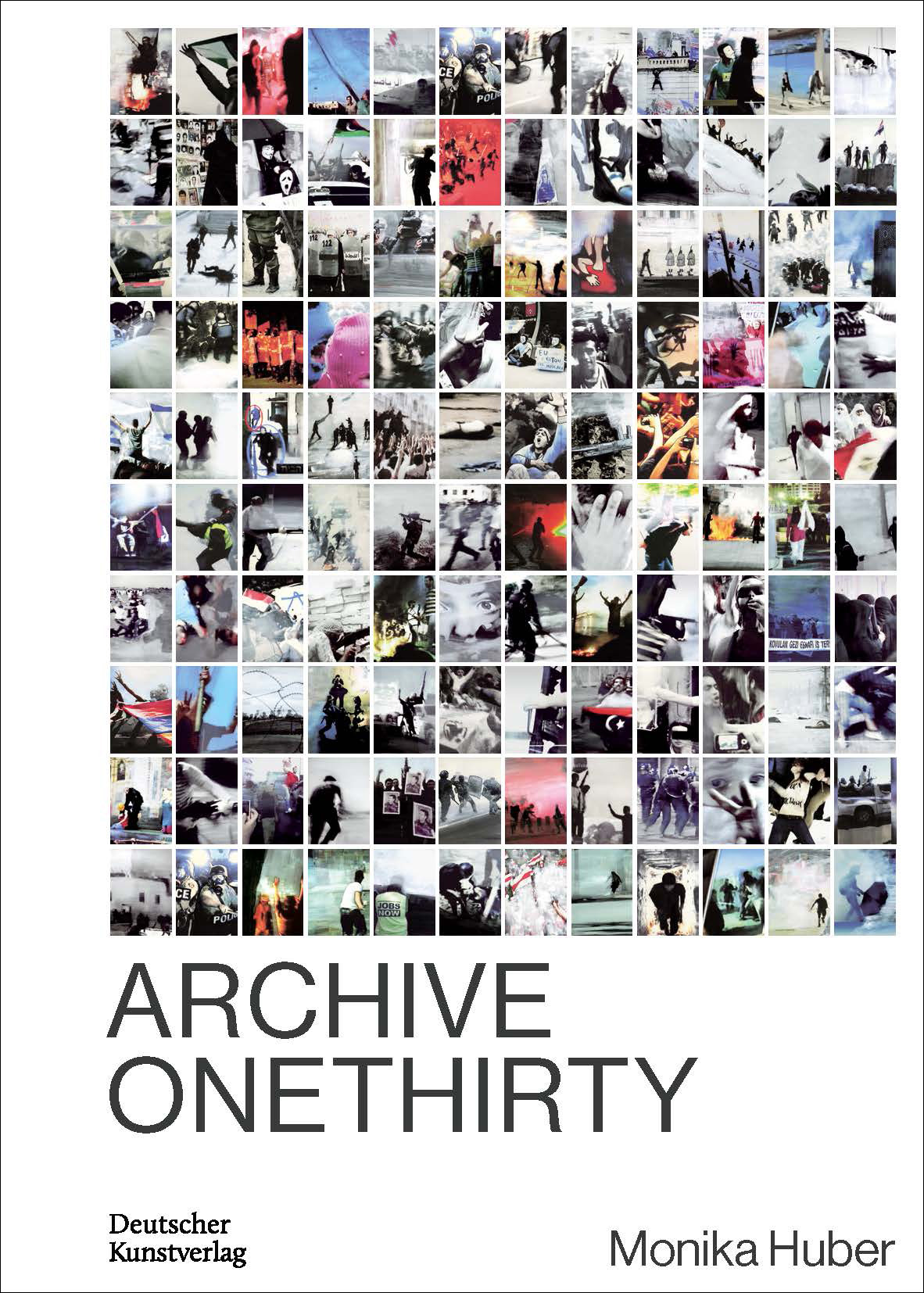
2023
Productive Archiving
Artistic Strategies, Future Memories
and Fluid Indentities
Artistic Strategies, Future Memories
and Fluid Indentities
Valiz
Ed. Ernst van Alphen
Texts: Ernst van Alphen, Aleida Assmann, Annet Dekker, Lars Ebert, Sebastián Díaz Morales, Monika Huber, William Kentridge, Pablo Lerma, Inge Meijer, Santu Mofokeng, Merapi Obermayer, Walid Raad, Ana Paula Saab, Drew Sawyer, Carla Subrizi, Marjan Teeuwen, Daria Tuminas, Jeffrey Wallen
ISBN 978-94-93246-16-4
Link to the book
Ed. Ernst van Alphen
Texts: Ernst van Alphen, Aleida Assmann, Annet Dekker, Lars Ebert, Sebastián Díaz Morales, Monika Huber, William Kentridge, Pablo Lerma, Inge Meijer, Santu Mofokeng, Merapi Obermayer, Walid Raad, Ana Paula Saab, Drew Sawyer, Carla Subrizi, Marjan Teeuwen, Daria Tuminas, Jeffrey Wallen
ISBN 978-94-93246-16-4
Link to the book
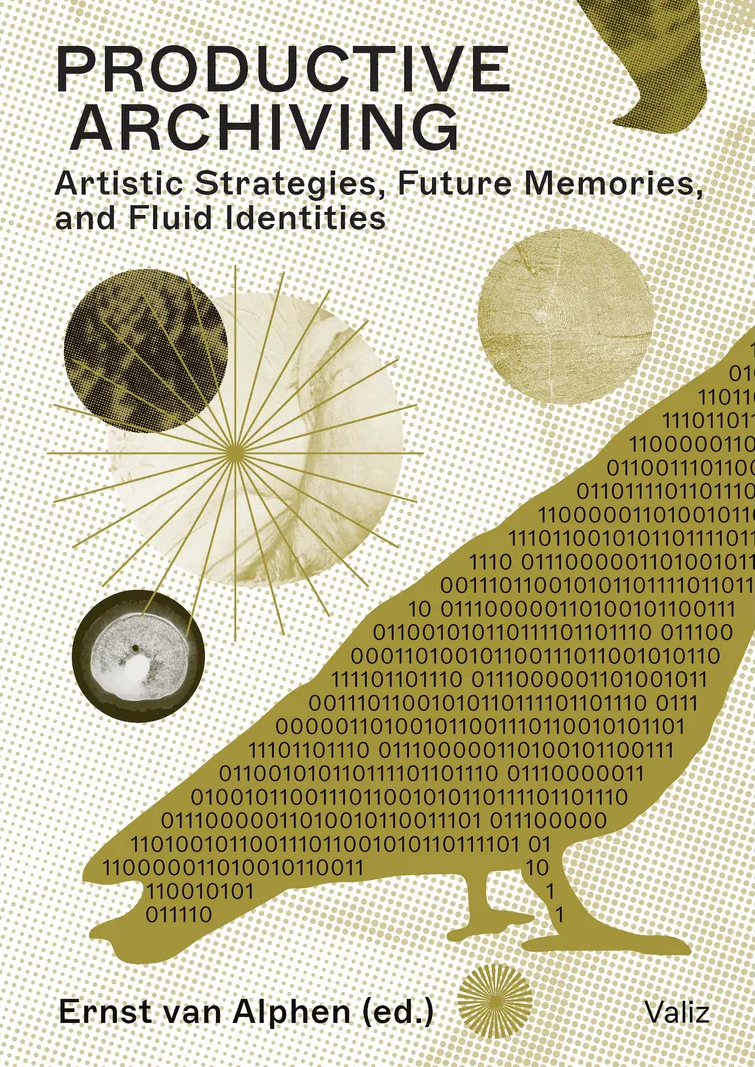
2018
news flash
Kunsthalle Nürnberg
Verlag für moderne Kunst Nürnberg
Ed. Kunsthalle Nürnberg
Texts: Matthias Dachwald, Tabea Hartig, Ute Schaeffer, Daniel Schreiber, Ellen Seidelmann, Dr. Harriet Zilch
ISBN Nr. 978-3-903269-05-7
Verlag für moderne Kunst Nürnberg
Ed. Kunsthalle Nürnberg
Texts: Matthias Dachwald, Tabea Hartig, Ute Schaeffer, Daniel Schreiber, Ellen Seidelmann, Dr. Harriet Zilch
ISBN Nr. 978-3-903269-05-7

2012
News – the televised revolution
Hirmer Verlag/University of Chicago Press
Ed. Monika Huber, Susanne Fischer
Texts: Susanne Fischer, Raghda al-Halawany, Maryam Hassan, Sabry Khaled, Zainab al-Khawaja, Raed Rafei, Tiare Rath, Hazim al-Sharaa, Atiaf al-Wazir, Ulrich Wilmes, Razan Zeitouneh
ISBN 978-3-7774-5581-5
Link to the book
Ed. Monika Huber, Susanne Fischer
Texts: Susanne Fischer, Raghda al-Halawany, Maryam Hassan, Sabry Khaled, Zainab al-Khawaja, Raed Rafei, Tiare Rath, Hazim al-Sharaa, Atiaf al-Wazir, Ulrich Wilmes, Razan Zeitouneh
ISBN 978-3-7774-5581-5
Link to the book

2012
BILD GEGEN BILD
Haus der Kunst Munich
Verlag der Buchhandlung Walther König, Köln
Ed. Patrizia Dander, Julienne Lorz
Texts: Patrizia Dander, Georges Didi-Huberman, Okwui Enwezor, Tom Holert, Leon Krempel, David Levi Strauss, Julienne Lorz, Marion G. Müller, Johanna Platter, Ulrich Wilmes
ISBN 978-3-86335-208-0
Verlag der Buchhandlung Walther König, Köln
Ed. Patrizia Dander, Julienne Lorz
Texts: Patrizia Dander, Georges Didi-Huberman, Okwui Enwezor, Tom Holert, Leon Krempel, David Levi Strauss, Julienne Lorz, Marion G. Müller, Johanna Platter, Ulrich Wilmes
ISBN 978-3-86335-208-0
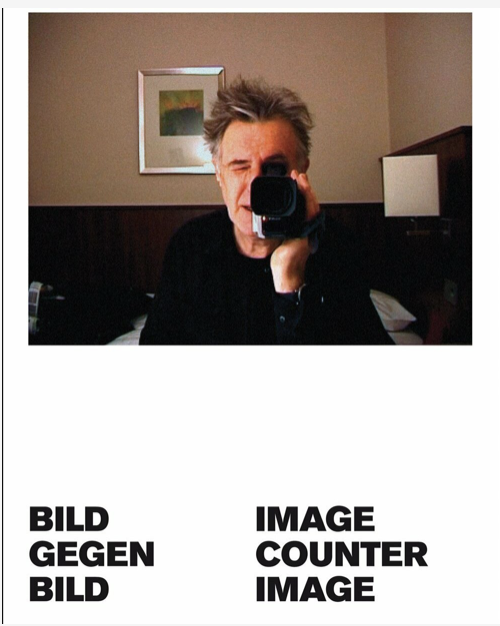
2010
Stationen
Catalogue of the exhibition Monika Huber and Rudolf Wachter at the Städtische Galerie, Rosenheim
Ed. Dr. Erika Wäcker-Babnik
Text: Dr. Erika Wäcker-Babnik
ISBN Nr. 978-3-00-030148-3
Ed. Dr. Erika Wäcker-Babnik
Text: Dr. Erika Wäcker-Babnik
ISBN Nr. 978-3-00-030148-3

2005
Monika Huber
Exhibition at Deutsche Bank Munich
Exhibition at Deutsche Bank Munich
Verlag für moderne Kunst Nürnberg
Ed. Deutsche Bank
Texts: Prof. Dr. Helmut Friedel, Dr. Adriane Grigoteit, Monika Huber, Dr. Beatrice Lavarini, Konrad Schmidt, Dr. Ulrich Schürenkrämer
ISBN Nr. 3-938821-12-4
Ed. Deutsche Bank
Texts: Prof. Dr. Helmut Friedel, Dr. Adriane Grigoteit, Monika Huber, Dr. Beatrice Lavarini, Konrad Schmidt, Dr. Ulrich Schürenkrämer
ISBN Nr. 3-938821-12-4
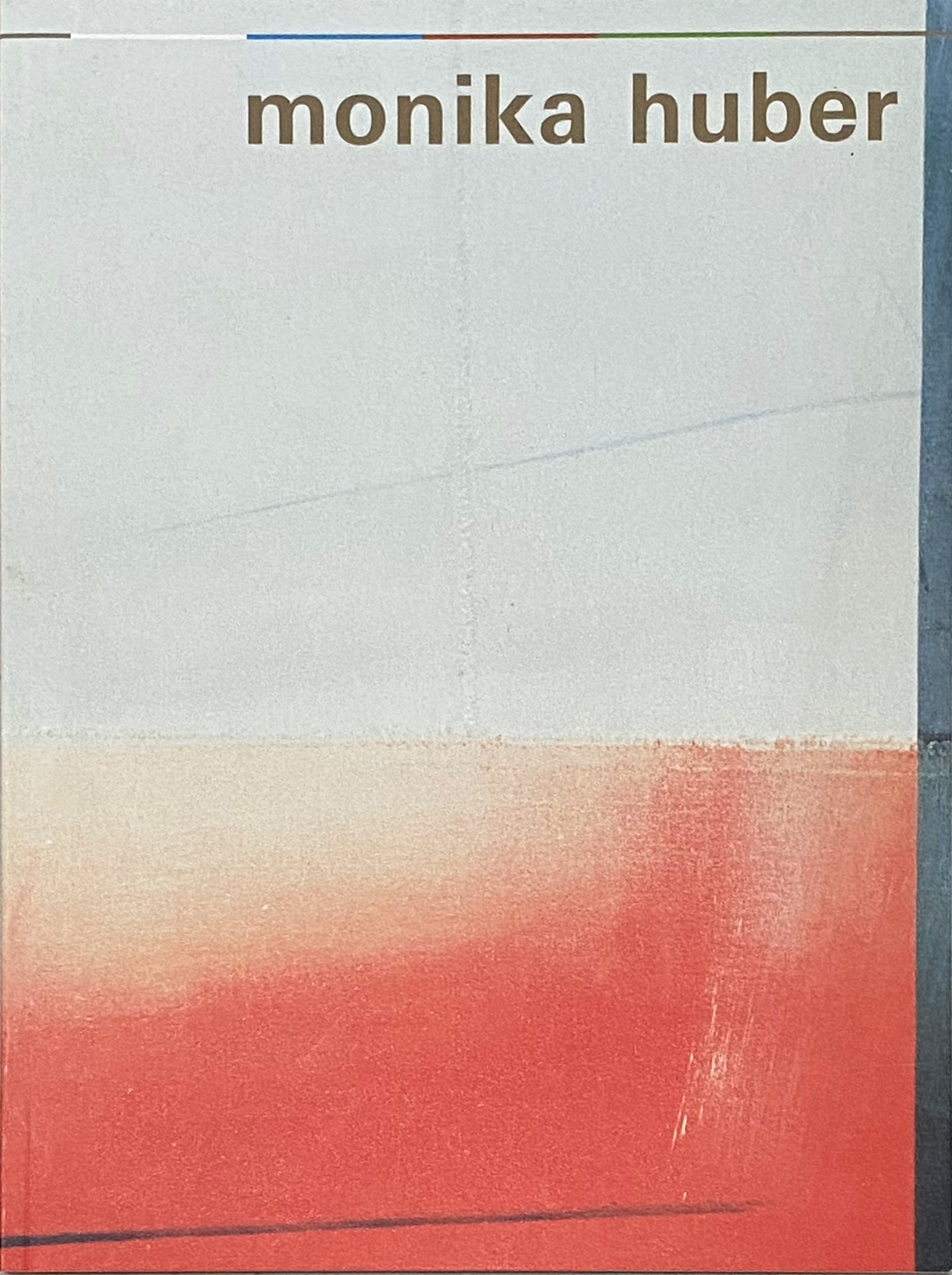
1997
Monika Huber
Exhibition series:
Städtische Galerie Regensburg
Kunstverein Ahlen
Museum für Neue Kunst Freiburg
Heidelberger Kunstverein
Exhibition series:
Städtische Galerie Regensburg
Kunstverein Ahlen
Museum für Neue Kunst Freiburg
Heidelberger Kunstverein
Ed. Institut für moderne Kunst Nürnberg
Texts: Konrad Schmidt, Jochen Ludwig, Hans Gercke, Simone Dattenberger, Werner Fritsch
ISBN 3-928342-81-9
Texts: Konrad Schmidt, Jochen Ludwig, Hans Gercke, Simone Dattenberger, Werner Fritsch
ISBN 3-928342-81-9

1989
Monika Huber
Exhibition series:
Wilhelm-Hack Museum, Ludwigshafen
Mittelrhein-Museum Koblenz
Kunsthalle Bielefeld
Städtische Galerie Würzburg
Von der Heydt-Museum, Wuppertal
Städtische Galerie Ingolstadt
Exhibition series:
Wilhelm-Hack Museum, Ludwigshafen
Mittelrhein-Museum Koblenz
Kunsthalle Bielefeld
Städtische Galerie Würzburg
Von der Heydt-Museum, Wuppertal
Städtische Galerie Ingolstadt
Museum für Kunst- und Kulturgeschichte, Lübeck
Publisher: Galerie m Bochum
Ed. Galerie m Bochum
Texts: Bernhard Holeczek, Britta Buhlmann
ISBN 3-928342-81-9
Publisher: Galerie m Bochum
Ed. Galerie m Bochum
Texts: Bernhard Holeczek, Britta Buhlmann
ISBN 3-928342-81-9

Mail:
art@monikahuber.com
Address:
Homerstraße 10
D-80637 Munich
art@monikahuber.com
Address:
Homerstraße 10
D-80637 Munich
Galleries
Galerie Friedrich Müller
Braubachstraße 9
D-60311 Frankfurt am Main
Phone: +49 (0) 69 282839
www.japan-art.com
Galerie Smudajeschek
Schwindstraße 3
80798 Munich
Phone: +49 (0) 173 3110309
www.smudajescheck.com
Image requests:
© VG-Bild Kunst Bonn, 2023
Galerie Friedrich Müller
Braubachstraße 9
D-60311 Frankfurt am Main
Phone: +49 (0) 69 282839
www.japan-art.com
Galerie Smudajeschek
Schwindstraße 3
80798 Munich
Phone: +49 (0) 173 3110309
www.smudajescheck.com
Image requests:
© VG-Bild Kunst Bonn, 2023
Information according to §5 TMG:
Monika Huber
Homerstraße 10
80637 Munich
Germany
art@monikahuber.com
Sales tax identification number
according to § 27 a sales tax law:
DE 129 776 018
Monika Huber
Homerstraße 10
80637 Munich
Germany
art@monikahuber.com
Sales tax identification number
according to § 27 a sales tax law:
DE 129 776 018
Privacy Policy
Data protection is of a particularly high priority for the management of Monika Huber. The use of the Internet pages of Monika Huber is possible without any indication of personal data; however, if a data subject wants to use special enterprise services via our website, processing of personal data could become necessary. If the processing of personal data is necessary and there is no statutory basis for such processing, we generally obtain consent from the data subject.
The processing of personal data, such as the name, address, e-mail address, or telephone number of a data subject shall always be in line with the General Data Protection Regulation (GDPR), and in accordance with the country-specific data protection regulations applicable to Monika Huber. By means of this data protection declaration, our enterprise would like to inform the general public of the nature, scope, and purpose of the personal data we collect, use and process. Furthermore, data subjects are informed, by means of this data protection declaration, of the rights to which they are entitled.
As the controller, Monika Huber has implemented numerous technical and organizational measures to ensure the most complete protection of personal data processed through this website. However, Internet-based data transmissions may in principle have security gaps, so absolute protection may not be guaranteed. For this reason, every data subject is free to transfer personal data to us via alternative means, e.g. by telephone.
1. Definitions
The data protection declaration of Monika Huber is based on the terms used by the European legislator for the adoption of the General Data Protection Regulation (GDPR). Our data protection declaration should be legible and understandable for the general public, as well as our customers and business partners. To ensure this, we would like to first explain the terminology used.
In this data protection declaration, we use, inter alia, the following terms:
2. Name and Address of the controller
Controller for the purposes of the General Data Protection Regulation (GDPR), other data protection laws applicable in Member states of the European Union and other provisions related to data protection is:
Monika Huber
Homerstraße 10
80637 Munich
Germany
Email: art@monikahuber.com
Website: www.monikahuber.com
3. Cookies
The Internet pages of Monika Huber use cookies. Cookies are text files that are stored in a computer system via an Internet browser.
Many Internet sites and servers use cookies. Many cookies contain a so-called cookie ID. A cookie ID is a unique identifier of the cookie. It consists of a character string through which Internet pages and servers can be assigned to the specific Internet browser in which the cookie was stored. This allows visited Internet sites and servers to differentiate the individual browser of the dats subject from other Internet browsers that contain other cookies. A specific Internet browser can be recognized and identified using the unique cookie ID.
Through the use of cookies, Monika Huber can provide the users of this website with more user-friendly services that would not be possible without the cookie setting.
By means of a cookie, the information and offers on our website can be optimized with the user in mind. Cookies allow us, as previously mentioned, to recognize our website users. The purpose of this recognition is to make it easier for users to utilize our website. The website user that uses cookies, e.g. does not have to enter access data each time the website is accessed, because this is taken over by the website, and the cookie is thus stored on the user's computer system. Another example is the cookie of a shopping cart in an online shop. The online store remembers the articles that a customer has placed in the virtual shopping cart via a cookie.
The data subject may, at any time, prevent the setting of cookies through our website by means of a corresponding setting of the Internet browser used, and may thus permanently deny the setting of cookies. Furthermore, already set cookies may be deleted at any time via an Internet browser or other software programs. This is possible in all popular Internet browsers. If the data subject deactivates the setting of cookies in the Internet browser used, not all functions of our website may be entirely usable.
4. Collection of general data and information
The website of Monika Huber collects a series of general data and information when a data subject or automated system calls up the website. This general data and information are stored in the server log files. Collected may be (1) the browser types and versions used, (2) the operating system used by the accessing system, (3) the website from which an accessing system reaches our website (so-called referrers), (4) the sub-websites, (5) the date and time of access to the Internet site, (6) an Internet protocol address (IP address), (7) the Internet service provider of the accessing system, and (8) any other similar data and information that may be used in the event of attacks on our information technology systems.
When using these general data and information, Monika Huber does not draw any conclusions about the data subject. Rather, this information is needed to (1) deliver the content of our website correctly, (2) optimize the content of our website as well as its advertisement, (3) ensure the long-term viability of our information technology systems and website technology, and (4) provide law enforcement authorities with the information necessary for criminal prosecution in case of a cyber-attack. Therefore, Monika Huber analyzes anonymously collected data and information statistically, with the aim of increasing the data protection and data security of our enterprise, and to ensure an optimal level of protection for the personal data we process. The anonymous data of the server log files are stored separately from all personal data provided by a data subject.
5. Routine erasure and blocking of personal data
The data controller shall process and store the personal data of the data subject only for the period necessary to achieve the purpose of storage, or as far as this is granted by the European legislator or other legislators in laws or regulations to which the controller is subject to.
If the storage purpose is not applicable, or if a storage period prescribed by the European legislator or another competent legislator expires, the personal data are routinely blocked or erased in accordance with legal requirements.
6. Rights of the data subject
7. Data protection provisions about the application and use of Google Analytics (with anonymization function)
On this website, the controller has integrated the component of Google Analytics (with the anonymizer function). Google Analytics is a web analytics service. Web analytics is the collection, gathering, and analysis of data about the behavior of visitors to websites. A web analysis service collects, inter alia, data about the website from which a person has come (the so-called referrer), which sub-pages were visited, or how often and for what duration a sub-page was viewed. Web analytics are mainly used for the optimization of a website and in order to carry out a cost-benefit analysis of Internet advertising.
The operator of the Google Analytics component is Google Ireland Limited, Gordon House, Barrow Street, Dublin, D04 E5W5, Ireland.
For the web analytics through Google Analytics the controller uses the application "_gat. _anonymizeIp". By means of this application the IP address of the Internet connection of the data subject is abridged by Google and anonymised when accessing our websites from a Member State of the European Union or another Contracting State to the Agreement on the European Economic Area.
The purpose of the Google Analytics component is to analyze the traffic on our website. Google uses the collected data and information, inter alia, to evaluate the use of our website and to provide online reports, which show the activities on our websites, and to provide other services concerning the use of our Internet site for us.
Google Analytics places a cookie on the information technology system of the data subject. The definition of cookies is explained above. With the setting of the cookie, Google is enabled to analyze the use of our website. With each call-up to one of the individual pages of this Internet site, which is operated by the controller and into which a Google Analytics component was integrated, the Internet browser on the information technology system of the data subject will automatically submit data through the Google Analytics component for the purpose of online advertising and the settlement of commissions to Google. During the course of this technical procedure, the enterprise Google gains knowledge of personal information, such as the IP address of the data subject, which serves Google, inter alia, to understand the origin of visitors and clicks, and subsequently create commission settlements.
The cookie is used to store personal information, such as the access time, the location from which the access was made, and the frequency of visits of our website by the data subject. With each visit to our Internet site, such personal data, including the IP address of the Internet access used by the data subject, will be transmitted to Google in the United States of America. These personal data are stored by Google in the United States of America. Google may pass these personal data collected through the technical procedure to third parties.
The data subject may, as stated above, prevent the setting of cookies through our website at any time by means of a corresponding adjustment of the web browser used and thus permanently deny the setting of cookies. Such an adjustment to the Internet browser used would also prevent Google Analytics from setting a cookie on the information technology system of the data subject. In addition, cookies already in use by Google Analytics may be deleted at any time via a web browser or other software programs.
In addition, the data subject has the possibility of objecting to a collection of data that are generated by Google Analytics, which is related to the use of this website, as well as the processing of this data by Google and the chance to preclude any such. For this purpose, the data subject must download a browser add-on under the link https://tools.google.com/dlpage/gaoptout and install it. This browser add-on tells Google Analytics through a JavaScript, that any data and information about the visits of Internet pages may not be transmitted to Google Analytics. The installation of the browser add-ons is considered an objection by Google. If the information technology system of the data subject is later deleted, formatted, or newly installed, then the data subject must reinstall the browser add-ons to disable Google Analytics. If the browser add-on was uninstalled by the data subject or any other person who is attributable to their sphere of competence, or is disabled, it is possible to execute the reinstallation or reactivation of the browser add-ons.
Further information and the applicable data protection provisions of Google may be retrieved under https://www.google.com/intl/en/policies/privacy/ and under http://www.google.com/analytics/terms/us.html. Google Analytics is further explained under the following Link https://www.google.com/analytics/.
8. Legal basis for the processing
Art. 6(1) lit. a GDPR serves as the legal basis for processing operations for which we obtain consent for a specific processing purpose. If the processing of personal data is necessary for the performance of a contract to which the data subject is party, as is the case, for example, when processing operations are necessary for the supply of goods or to provide any other service, the processing is based on Article 6(1) lit. b GDPR. The same applies to such processing operations which are necessary for carrying out pre-contractual measures, for example in the case of inquiries concerning our products or services. Is our company subject to a legal obligation by which processing of personal data is required, such as for the fulfillment of tax obligations, the processing is based on Art. 6(1) lit. c GDPR. In rare cases, the processing of personal data may be necessary to protect the vital interests of the data subject or of another natural person. This would be the case, for example, if a visitor were injured in our company and his name, age, health insurance data or other vital information would have to be passed on to a doctor, hospital or other third party. Then the processing would be based on Art. 6(1) lit. d GDPR. Finally, processing operations could be based on Article 6(1) lit. f GDPR. This legal basis is used for processing operations which are not covered by any of the abovementioned legal grounds, if processing is necessary for the purposes of the legitimate interests pursued by our company or by a third party, except where such interests are overridden by the interests or fundamental rights and freedoms of the data subject which require protection of personal data. Such processing operations are particularly permissible because they have been specifically mentioned by the European legislator. He considered that a legitimate interest could be assumed if the data subject is a client of the controller (Recital 47 Sentence 2 GDPR).
9. The legitimate interests pursued by the controller or by a third party
Where the processing of personal data is based on Article 6(1) lit. f GDPR our legitimate interest is to carry out our business in favor of the well-being of all our employees and the shareholders.
10. Period for which the personal data will be stored
The criteria used to determine the period of storage of personal data is the respective statutory retention period. After expiration of that period, the corresponding data is routinely deleted, as long as it is no longer necessary for the fulfillment of the contract or the initiation of a contract.
11. Provision of personal data as statutory or contractual requirement; Requirement necessary to enter into a contract; Obligation of the data subject to provide the personal data; possible consequences of failure to provide such data
We clarify that the provision of personal data is partly required by law (e.g. tax regulations) or can also result from contractual provisions (e.g. information on the contractual partner). Sometimes it may be necessary to conclude a contract that the data subject provides us with personal data, which must subsequently be processed by us. The data subject is, for example, obliged to provide us with personal data when our company signs a contract with him or her. The non-provision of the personal data would have the consequence that the contract with the data subject could not be concluded. Before personal data is provided by the data subject, the data subject must contact any employee. The employee clarifies to the data subject whether the provision of the personal data is required by law or contract or is necessary for the conclusion of the contract, whether there is an obligation to provide the personal data and the consequences of non-provision of the personal data.
12. Existence of automated decision-making
As a responsible company, we do not use automatic decision-making or profiling.
The legal texts contained in our privacy policy generator have been provided and published by Prof. Dr. h.c. Heiko Jonny Maniero from the German Association for Data Protection and Christian Solmecke from WBS law.
https://www.wbs.legal
Data protection is of a particularly high priority for the management of Monika Huber. The use of the Internet pages of Monika Huber is possible without any indication of personal data; however, if a data subject wants to use special enterprise services via our website, processing of personal data could become necessary. If the processing of personal data is necessary and there is no statutory basis for such processing, we generally obtain consent from the data subject.
The processing of personal data, such as the name, address, e-mail address, or telephone number of a data subject shall always be in line with the General Data Protection Regulation (GDPR), and in accordance with the country-specific data protection regulations applicable to Monika Huber. By means of this data protection declaration, our enterprise would like to inform the general public of the nature, scope, and purpose of the personal data we collect, use and process. Furthermore, data subjects are informed, by means of this data protection declaration, of the rights to which they are entitled.
As the controller, Monika Huber has implemented numerous technical and organizational measures to ensure the most complete protection of personal data processed through this website. However, Internet-based data transmissions may in principle have security gaps, so absolute protection may not be guaranteed. For this reason, every data subject is free to transfer personal data to us via alternative means, e.g. by telephone.
1. Definitions
The data protection declaration of Monika Huber is based on the terms used by the European legislator for the adoption of the General Data Protection Regulation (GDPR). Our data protection declaration should be legible and understandable for the general public, as well as our customers and business partners. To ensure this, we would like to first explain the terminology used.
In this data protection declaration, we use, inter alia, the following terms:
- a) Personal data
Personal data means any information relating to an identified or identifiable natural person (“data subject”). An identifiable natural person is one who can be identified, directly or indirectly, in particular by reference to an identifier such as a name, an identification number, location data, an online identifier or to one or more factors specific to the physical, physiological, genetic, mental, economic, cultural or social identity of that natural person. - b) Data subject
Data subject is any identified or identifiable natural person, whose personal data is processed by the controller responsible for the processing. - c) Processing
Processing is any operation or set of operations which is performed on personal data or on sets of personal data, whether or not by automated means, such as collection, recording, organisation, structuring, storage, adaptation or alteration, retrieval, consultation, use, disclosure by transmission, dissemination or otherwise making available, alignment or combination, restriction, erasure or destruction. - d) Restriction of processing
Restriction of processing is the marking of stored personal data with the aim of limiting their processing in the future. - e) Profiling
Profiling means any form of automated processing of personal data consisting of the use of personal data to evaluate certain personal aspects relating to a natural person, in particular to analyse or predict aspects concerning that natural person's performance at work, economic situation, health, personal preferences, interests, reliability, behaviour, location or movements. - f) Pseudonymisation
Pseudonymisation is the processing of personal data in such a manner that the personal data can no longer be attributed to a specific data subject without the use of additional information, provided that such additional information is kept separately and is subject to technical and organisational measures to ensure that the personal data are not attributed to an identified or identifiable natural person. - g) Controller or controller responsible for the processing
Controller or controller responsible for the processing is the natural or legal person, public authority, agency or other body which, alone or jointly with others, determines the purposes and means of the processing of personal data; where the purposes and means of such processing are determined by Union or Member State law, the controller or the specific criteria for its nomination may be provided for by Union or Member State law. - h) Processor
Processor is a natural or legal person, public authority, agency or other body which processes personal data on behalf of the controller. - i) Recipient
Recipient is a natural or legal person, public authority, agency or another body, to which the personal data are disclosed, whether a third party or not. However, public authorities which may receive personal data in the framework of a particular inquiry in accordance with Union or Member State law shall not be regarded as recipients; the processing of those data by those public authorities shall be in compliance with the applicable data protection rules according to the purposes of the processing. - j) Third party
Third party is a natural or legal person, public authority, agency or body other than the data subject, controller, processor and persons who, under the direct authority of the controller or processor, are authorised to process personal data. - k) Consent
Consent of the data subject is any freely given, specific, informed and unambiguous indication of the data subject's wishes by which he or she, by a statement or by a clear affirmative action, signifies agreement to the processing of personal data relating to him or her.
2. Name and Address of the controller
Controller for the purposes of the General Data Protection Regulation (GDPR), other data protection laws applicable in Member states of the European Union and other provisions related to data protection is:
Monika Huber
Homerstraße 10
80637 Munich
Germany
Email: art@monikahuber.com
Website: www.monikahuber.com
3. Cookies
The Internet pages of Monika Huber use cookies. Cookies are text files that are stored in a computer system via an Internet browser.
Many Internet sites and servers use cookies. Many cookies contain a so-called cookie ID. A cookie ID is a unique identifier of the cookie. It consists of a character string through which Internet pages and servers can be assigned to the specific Internet browser in which the cookie was stored. This allows visited Internet sites and servers to differentiate the individual browser of the dats subject from other Internet browsers that contain other cookies. A specific Internet browser can be recognized and identified using the unique cookie ID.
Through the use of cookies, Monika Huber can provide the users of this website with more user-friendly services that would not be possible without the cookie setting.
By means of a cookie, the information and offers on our website can be optimized with the user in mind. Cookies allow us, as previously mentioned, to recognize our website users. The purpose of this recognition is to make it easier for users to utilize our website. The website user that uses cookies, e.g. does not have to enter access data each time the website is accessed, because this is taken over by the website, and the cookie is thus stored on the user's computer system. Another example is the cookie of a shopping cart in an online shop. The online store remembers the articles that a customer has placed in the virtual shopping cart via a cookie.
The data subject may, at any time, prevent the setting of cookies through our website by means of a corresponding setting of the Internet browser used, and may thus permanently deny the setting of cookies. Furthermore, already set cookies may be deleted at any time via an Internet browser or other software programs. This is possible in all popular Internet browsers. If the data subject deactivates the setting of cookies in the Internet browser used, not all functions of our website may be entirely usable.
4. Collection of general data and information
The website of Monika Huber collects a series of general data and information when a data subject or automated system calls up the website. This general data and information are stored in the server log files. Collected may be (1) the browser types and versions used, (2) the operating system used by the accessing system, (3) the website from which an accessing system reaches our website (so-called referrers), (4) the sub-websites, (5) the date and time of access to the Internet site, (6) an Internet protocol address (IP address), (7) the Internet service provider of the accessing system, and (8) any other similar data and information that may be used in the event of attacks on our information technology systems.
When using these general data and information, Monika Huber does not draw any conclusions about the data subject. Rather, this information is needed to (1) deliver the content of our website correctly, (2) optimize the content of our website as well as its advertisement, (3) ensure the long-term viability of our information technology systems and website technology, and (4) provide law enforcement authorities with the information necessary for criminal prosecution in case of a cyber-attack. Therefore, Monika Huber analyzes anonymously collected data and information statistically, with the aim of increasing the data protection and data security of our enterprise, and to ensure an optimal level of protection for the personal data we process. The anonymous data of the server log files are stored separately from all personal data provided by a data subject.
5. Routine erasure and blocking of personal data
The data controller shall process and store the personal data of the data subject only for the period necessary to achieve the purpose of storage, or as far as this is granted by the European legislator or other legislators in laws or regulations to which the controller is subject to.
If the storage purpose is not applicable, or if a storage period prescribed by the European legislator or another competent legislator expires, the personal data are routinely blocked or erased in accordance with legal requirements.
6. Rights of the data subject
- a) Right of confirmation
Each data subject shall have the right granted by the European legislator to obtain from the controller the confirmation as to whether or not personal data concerning him or her are being processed. If a data subject wishes to avail himself of this right of confirmation, he or she may, at any time, contact any employee of the controller. - b) Right of access
Each data subject shall have the right granted by the European legislator to obtain from the controller free information about his or her personal data stored at any time and a copy of this information. Furthermore, the European directives and regulations grant the data subject access to the following information: - the purposes of the processing;
- the categories of personal data concerned;
- the recipients or categories of recipients to whom the personal data have been or will be disclosed, in particular recipients in third countries or international organisations;
- where possible, the envisaged period for which the personal data will be stored, or, if not possible, the criteria used to determine that period;
- the existence of the right to request from the controller rectification or erasure of personal data, or restriction of processing of personal data concerning the data subject, or to object to such processing;
- the existence of the right to lodge a complaint with a supervisory authority;
- where the personal data are not collected from the data subject, any available information as to their source;
- the existence of automated decision-making, including profiling, referred to in Article 22(1) and (4) of the GDPR and, at least in those cases, meaningful information about the logic involved, as well as the significance and envisaged consequences of such processing for the data subject.
- Furthermore, the data subject shall have a right to obtain information as to whether personal data are transferred to a third country or to an international organisation. Where this is the case, the data subject shall have the right to be informed of the appropriate safeguards relating to the transfer.
If a data subject wishes to avail himself of this right of access, he or she may, at any time, contact any employee of the controller. - c) Right to rectification
Each data subject shall have the right granted by the European legislator to obtain from the controller without undue delay the rectification of inaccurate personal data concerning him or her. Taking into account the purposes of the processing, the data subject shall have the right to have incomplete personal data completed, including by means of providing a supplementary statement.
If a data subject wishes to exercise this right to rectification, he or she may, at any time, contact any employee of the controller. - d) Right to erasure (Right to be forgotten)
Each data subject shall have the right granted by the European legislator to obtain from the controller the erasure of personal data concerning him or her without undue delay, and the controller shall have the obligation to erase personal data without undue delay where one of the following grounds applies, as long as the processing is not necessary: - The personal data are no longer necessary in relation to the purposes for which they were collected or otherwise processed.
- The data subject withdraws consent to which the processing is based according to point (a) of Article 6(1) of the GDPR, or point (a) of Article 9(2) of the GDPR, and where there is no other legal ground for the processing.
- The data subject objects to the processing pursuant to Article 21(1) of the GDPR and there are no overriding legitimate grounds for the processing, or the data subject objects to the processing pursuant to Article 21(2) of the GDPR.
- The personal data have been unlawfully processed.
- The personal data must be erased for compliance with a legal obligation in Union or Member State law to which the controller is subject.
- The personal data have been collected in relation to the offer of information society services referred to in Article 8(1) of the GDPR.
- If one of the aforementioned reasons applies, and a data subject wishes to request the erasure of personal data stored by Monika Huber, he or she may, at any time, contact any employee of the controller. An employee of Monika Huber shall promptly ensure that the erasure request is complied with immediately.
Where the controller has made personal data public and is obliged pursuant to Article 17(1) to erase the personal data, the controller, taking account of available technology and the cost of implementation, shall take reasonable steps, including technical measures, to inform other controllers processing the personal data that the data subject has requested erasure by such controllers of any links to, or copy or replication of, those personal data, as far as processing is not required. An employees of Monika Huber will arrange the necessary measures in individual cases. - e) Right of restriction of processing
Each data subject shall have the right granted by the European legislator to obtain from the controller restriction of processing where one of the following applies: - The accuracy of the personal data is contested by the data subject, for a period enabling the controller to verify the accuracy of the personal data.
- The processing is unlawful and the data subject opposes the erasure of the personal data and requests instead the restriction of their use instead.
- The controller no longer needs the personal data for the purposes of the processing, but they are required by the data subject for the establishment, exercise or defence of legal claims.
- The data subject has objected to processing pursuant to Article 21(1) of the GDPR pending the verification whether the legitimate grounds of the controller override those of the data subject.
- If one of the aforementioned conditions is met, and a data subject wishes to request the restriction of the processing of personal data stored by Monika Huber, he or she may at any time contact any employee of the controller. The employee of Monika Huber will arrange the restriction of the processing.
- f) Right to data portability
Each data subject shall have the right granted by the European legislator, to receive the personal data concerning him or her, which was provided to a controller, in a structured, commonly used and machine-readable format. He or she shall have the right to transmit those data to another controller without hindrance from the controller to which the personal data have been provided, as long as the processing is based on consent pursuant to point (a) of Article 6(1) of the GDPR or point (a) of Article 9(2) of the GDPR, or on a contract pursuant to point (b) of Article 6(1) of the GDPR, and the processing is carried out by automated means, as long as the processing is not necessary for the performance of a task carried out in the public interest or in the exercise of official authority vested in the controller.
Furthermore, in exercising his or her right to data portability pursuant to Article 20(1) of the GDPR, the data subject shall have the right to have personal data transmitted directly from one controller to another, where technically feasible and when doing so does not adversely affect the rights and freedoms of others.
In order to assert the right to data portability, the data subject may at any time contact any employee of Monika Huber. - g) Right to object
Each data subject shall have the right granted by the European legislator to object, on grounds relating to his or her particular situation, at any time, to processing of personal data concerning him or her, which is based on point (e) or (f) of Article 6(1) of the GDPR. This also applies to profiling based on these provisions.
Monika Huber shall no longer process the personal data in the event of the objection, unless we can demonstrate compelling legitimate grounds for the processing which override the interests, rights and freedoms of the data subject, or for the establishment, exercise or defence of legal claims.
If Monika Huber processes personal data for direct marketing purposes, the data subject shall have the right to object at any time to processing of personal data concerning him or her for such marketing. This applies to profiling to the extent that it is related to such direct marketing. If the data subject objects to Monika Huber to the processing for direct marketing purposes, Monika Huber will no longer process the personal data for these purposes.
In addition, the data subject has the right, on grounds relating to his or her particular situation, to object to processing of personal data concerning him or her by Monika Huber for scientific or historical research purposes, or for statistical purposes pursuant to Article 89(1) of the GDPR, unless the processing is necessary for the performance of a task carried out for reasons of public interest.
In order to exercise the right to object, the data subject may contact any employee of Monika Huber. In addition, the data subject is free in the context of the use of information society services, and notwithstanding Directive 2002/58/EC, to use his or her right to object by automated means using technical specifications. - h) Automated individual decision-making, including profiling
Each data subject shall have the right granted by the European legislator not to be subject to a decision based solely on automated processing, including profiling, which produces legal effects concerning him or her, or similarly significantly affects him or her, as long as the decision (1) is not is necessary for entering into, or the performance of, a contract between the data subject and a data controller, or (2) is not authorised by Union or Member State law to which the controller is subject and which also lays down suitable measures to safeguard the data subject's rights and freedoms and legitimate interests, or (3) is not based on the data subject's explicit consent.
If the decision (1) is necessary for entering into, or the performance of, a contract between the data subject and a data controller, or (2) it is based on the data subject's explicit consent, Monika Huber shall implement suitable measures to safeguard the data subject's rights and freedoms and legitimate interests, at least the right to obtain human intervention on the part of the controller, to express his or her point of view and contest the decision.
If the data subject wishes to exercise the rights concerning automated individual decision-making, he or she may, at any time, contact any employee of Monika Huber. - i) Right to withdraw data protection consent
Each data subject shall have the right granted by the European legislator to withdraw his or her consent to processing of his or her personal data at any time.
If the data subject wishes to exercise the right to withdraw the consent, he or she may, at any time, contact any employee of Monika Huber.
7. Data protection provisions about the application and use of Google Analytics (with anonymization function)
On this website, the controller has integrated the component of Google Analytics (with the anonymizer function). Google Analytics is a web analytics service. Web analytics is the collection, gathering, and analysis of data about the behavior of visitors to websites. A web analysis service collects, inter alia, data about the website from which a person has come (the so-called referrer), which sub-pages were visited, or how often and for what duration a sub-page was viewed. Web analytics are mainly used for the optimization of a website and in order to carry out a cost-benefit analysis of Internet advertising.
The operator of the Google Analytics component is Google Ireland Limited, Gordon House, Barrow Street, Dublin, D04 E5W5, Ireland.
For the web analytics through Google Analytics the controller uses the application "_gat. _anonymizeIp". By means of this application the IP address of the Internet connection of the data subject is abridged by Google and anonymised when accessing our websites from a Member State of the European Union or another Contracting State to the Agreement on the European Economic Area.
The purpose of the Google Analytics component is to analyze the traffic on our website. Google uses the collected data and information, inter alia, to evaluate the use of our website and to provide online reports, which show the activities on our websites, and to provide other services concerning the use of our Internet site for us.
Google Analytics places a cookie on the information technology system of the data subject. The definition of cookies is explained above. With the setting of the cookie, Google is enabled to analyze the use of our website. With each call-up to one of the individual pages of this Internet site, which is operated by the controller and into which a Google Analytics component was integrated, the Internet browser on the information technology system of the data subject will automatically submit data through the Google Analytics component for the purpose of online advertising and the settlement of commissions to Google. During the course of this technical procedure, the enterprise Google gains knowledge of personal information, such as the IP address of the data subject, which serves Google, inter alia, to understand the origin of visitors and clicks, and subsequently create commission settlements.
The cookie is used to store personal information, such as the access time, the location from which the access was made, and the frequency of visits of our website by the data subject. With each visit to our Internet site, such personal data, including the IP address of the Internet access used by the data subject, will be transmitted to Google in the United States of America. These personal data are stored by Google in the United States of America. Google may pass these personal data collected through the technical procedure to third parties.
The data subject may, as stated above, prevent the setting of cookies through our website at any time by means of a corresponding adjustment of the web browser used and thus permanently deny the setting of cookies. Such an adjustment to the Internet browser used would also prevent Google Analytics from setting a cookie on the information technology system of the data subject. In addition, cookies already in use by Google Analytics may be deleted at any time via a web browser or other software programs.
In addition, the data subject has the possibility of objecting to a collection of data that are generated by Google Analytics, which is related to the use of this website, as well as the processing of this data by Google and the chance to preclude any such. For this purpose, the data subject must download a browser add-on under the link https://tools.google.com/dlpage/gaoptout and install it. This browser add-on tells Google Analytics through a JavaScript, that any data and information about the visits of Internet pages may not be transmitted to Google Analytics. The installation of the browser add-ons is considered an objection by Google. If the information technology system of the data subject is later deleted, formatted, or newly installed, then the data subject must reinstall the browser add-ons to disable Google Analytics. If the browser add-on was uninstalled by the data subject or any other person who is attributable to their sphere of competence, or is disabled, it is possible to execute the reinstallation or reactivation of the browser add-ons.
Further information and the applicable data protection provisions of Google may be retrieved under https://www.google.com/intl/en/policies/privacy/ and under http://www.google.com/analytics/terms/us.html. Google Analytics is further explained under the following Link https://www.google.com/analytics/.
8. Legal basis for the processing
Art. 6(1) lit. a GDPR serves as the legal basis for processing operations for which we obtain consent for a specific processing purpose. If the processing of personal data is necessary for the performance of a contract to which the data subject is party, as is the case, for example, when processing operations are necessary for the supply of goods or to provide any other service, the processing is based on Article 6(1) lit. b GDPR. The same applies to such processing operations which are necessary for carrying out pre-contractual measures, for example in the case of inquiries concerning our products or services. Is our company subject to a legal obligation by which processing of personal data is required, such as for the fulfillment of tax obligations, the processing is based on Art. 6(1) lit. c GDPR. In rare cases, the processing of personal data may be necessary to protect the vital interests of the data subject or of another natural person. This would be the case, for example, if a visitor were injured in our company and his name, age, health insurance data or other vital information would have to be passed on to a doctor, hospital or other third party. Then the processing would be based on Art. 6(1) lit. d GDPR. Finally, processing operations could be based on Article 6(1) lit. f GDPR. This legal basis is used for processing operations which are not covered by any of the abovementioned legal grounds, if processing is necessary for the purposes of the legitimate interests pursued by our company or by a third party, except where such interests are overridden by the interests or fundamental rights and freedoms of the data subject which require protection of personal data. Such processing operations are particularly permissible because they have been specifically mentioned by the European legislator. He considered that a legitimate interest could be assumed if the data subject is a client of the controller (Recital 47 Sentence 2 GDPR).
9. The legitimate interests pursued by the controller or by a third party
Where the processing of personal data is based on Article 6(1) lit. f GDPR our legitimate interest is to carry out our business in favor of the well-being of all our employees and the shareholders.
10. Period for which the personal data will be stored
The criteria used to determine the period of storage of personal data is the respective statutory retention period. After expiration of that period, the corresponding data is routinely deleted, as long as it is no longer necessary for the fulfillment of the contract or the initiation of a contract.
11. Provision of personal data as statutory or contractual requirement; Requirement necessary to enter into a contract; Obligation of the data subject to provide the personal data; possible consequences of failure to provide such data
We clarify that the provision of personal data is partly required by law (e.g. tax regulations) or can also result from contractual provisions (e.g. information on the contractual partner). Sometimes it may be necessary to conclude a contract that the data subject provides us with personal data, which must subsequently be processed by us. The data subject is, for example, obliged to provide us with personal data when our company signs a contract with him or her. The non-provision of the personal data would have the consequence that the contract with the data subject could not be concluded. Before personal data is provided by the data subject, the data subject must contact any employee. The employee clarifies to the data subject whether the provision of the personal data is required by law or contract or is necessary for the conclusion of the contract, whether there is an obligation to provide the personal data and the consequences of non-provision of the personal data.
12. Existence of automated decision-making
As a responsible company, we do not use automatic decision-making or profiling.
The legal texts contained in our privacy policy generator have been provided and published by Prof. Dr. h.c. Heiko Jonny Maniero from the German Association for Data Protection and Christian Solmecke from WBS law.
https://www.wbs.legal
